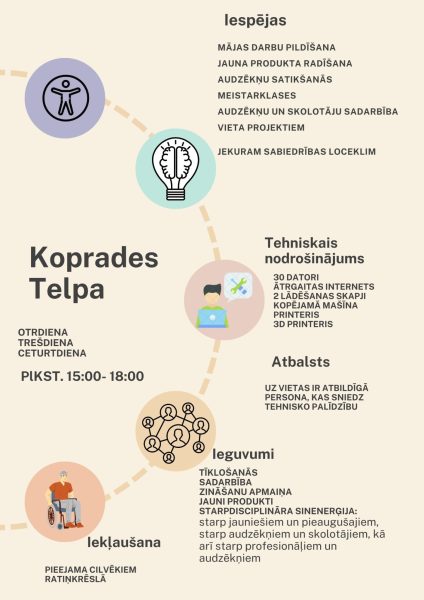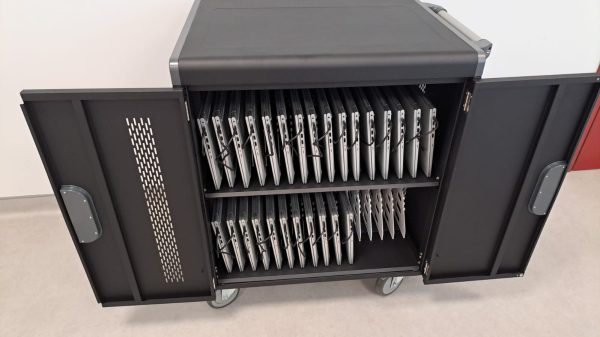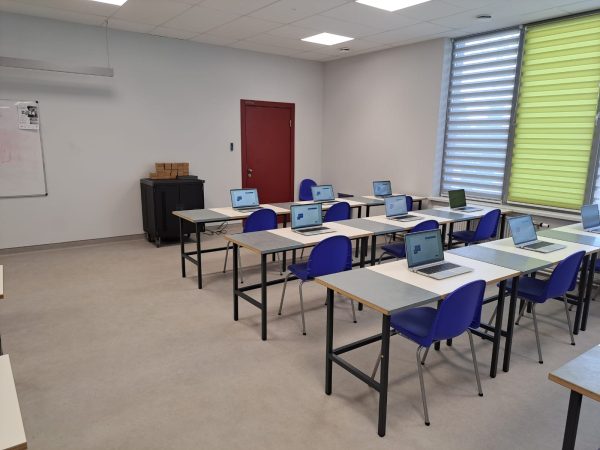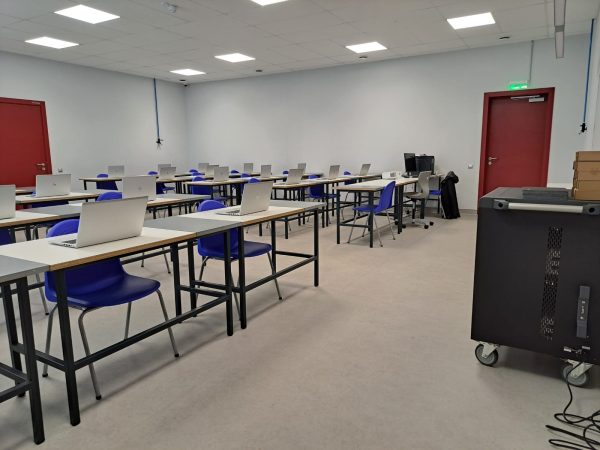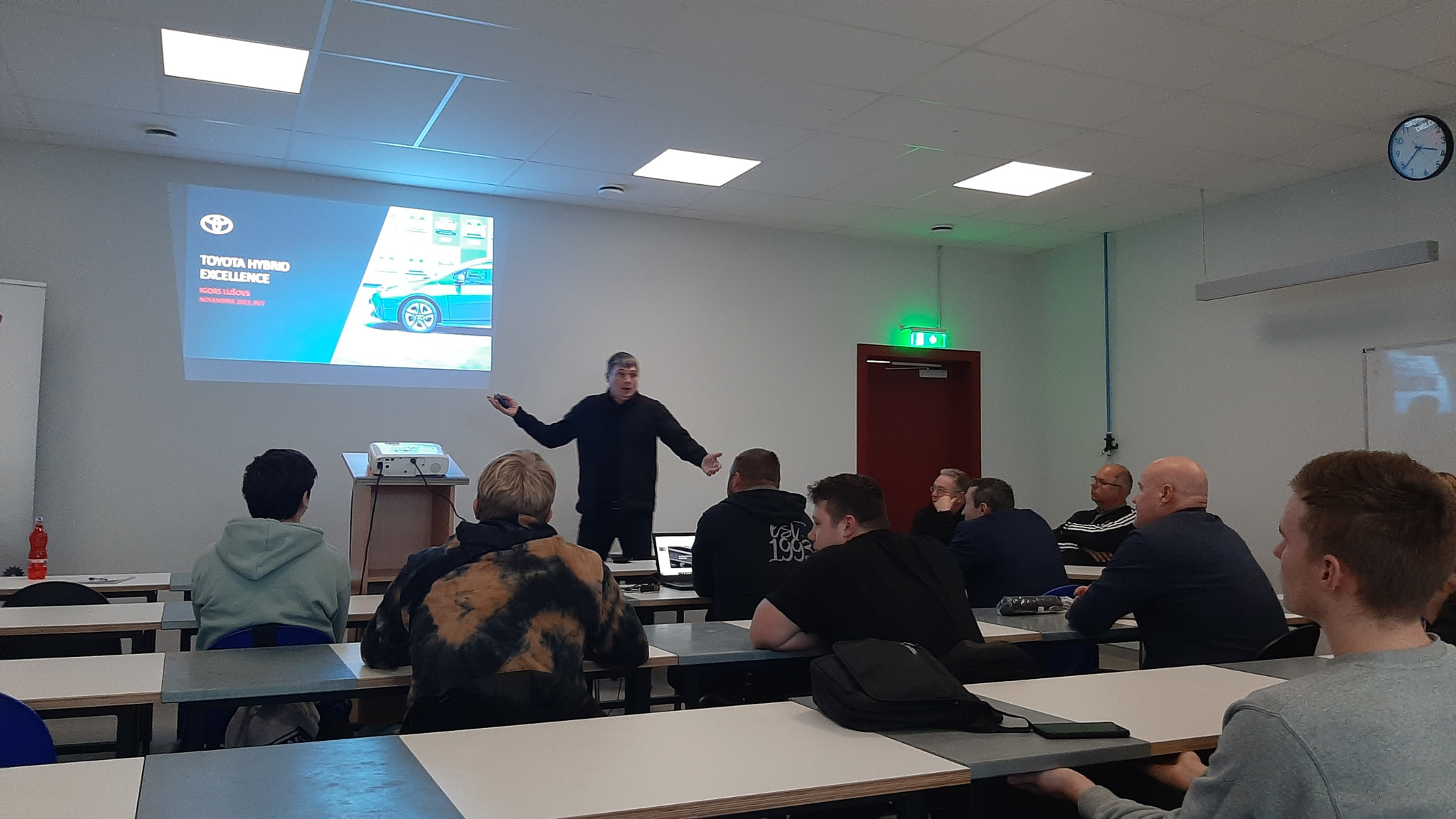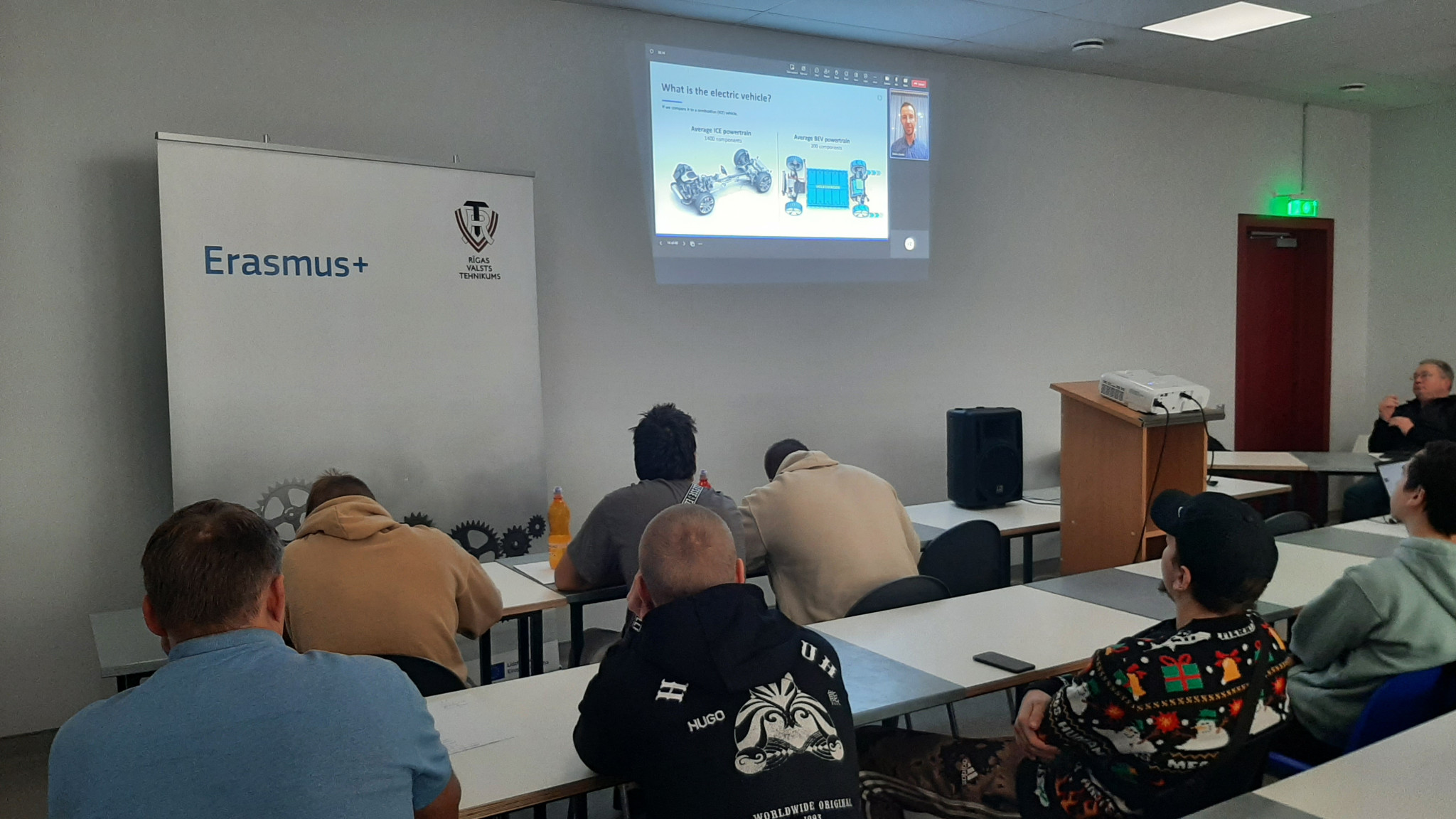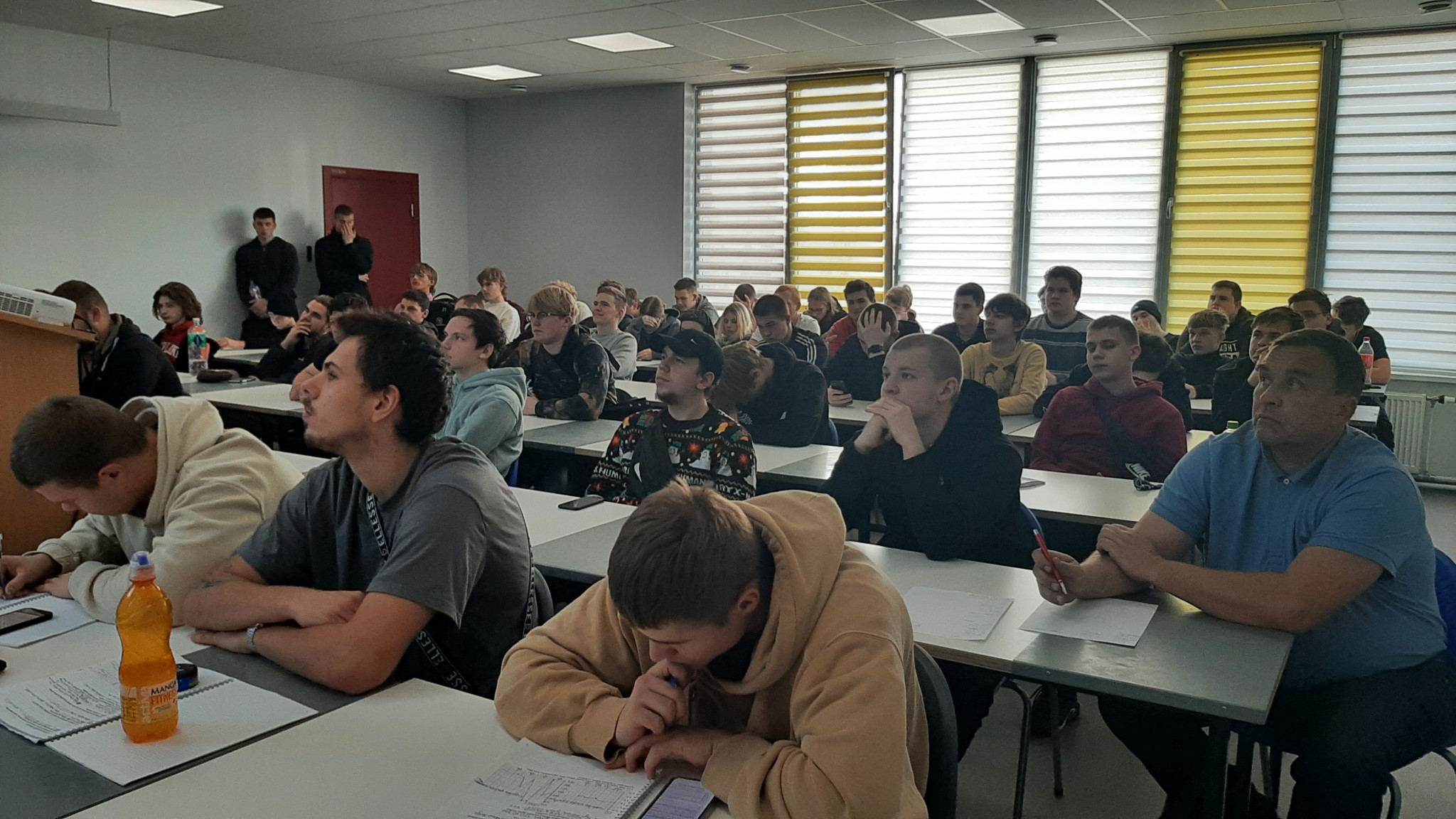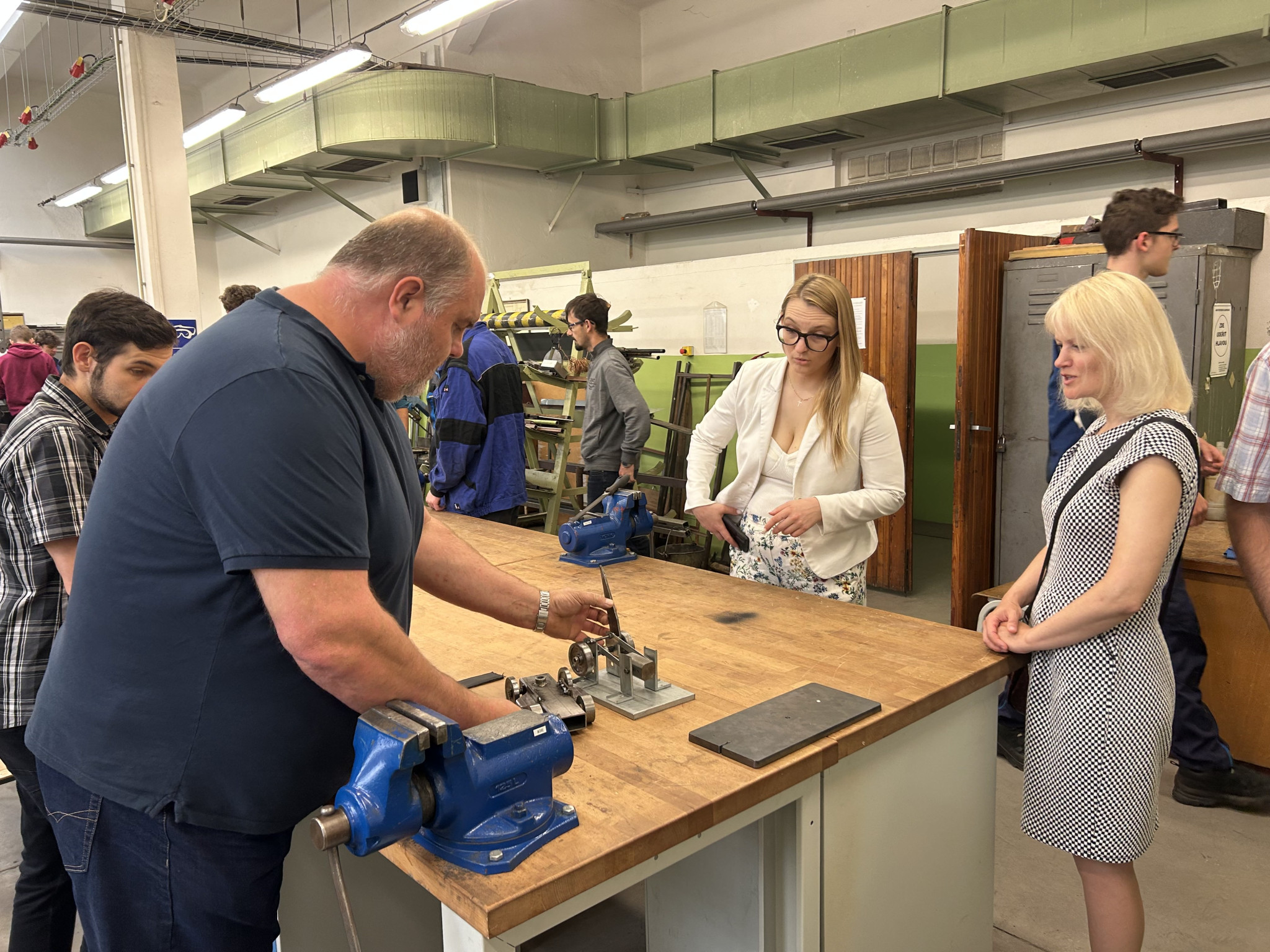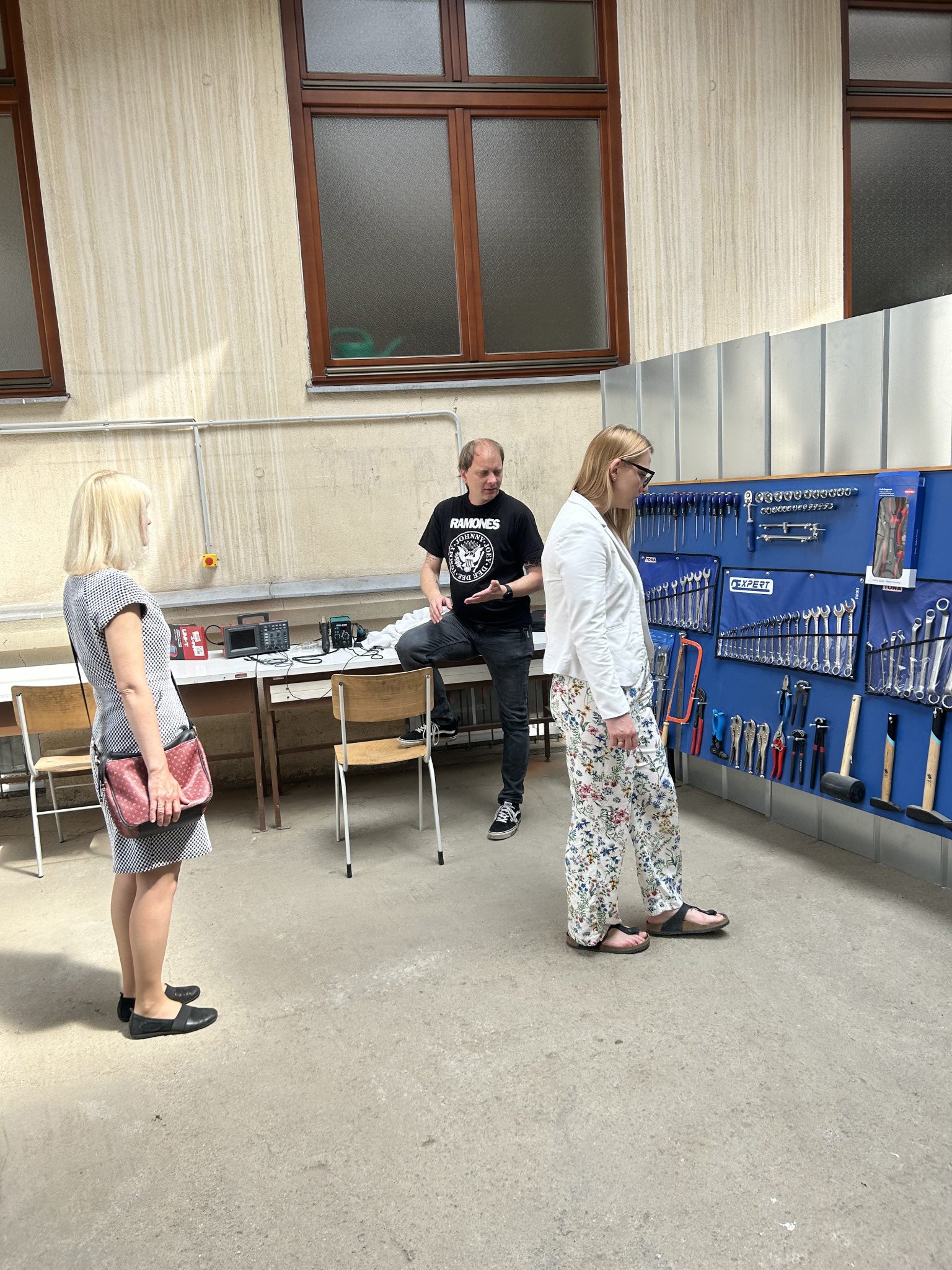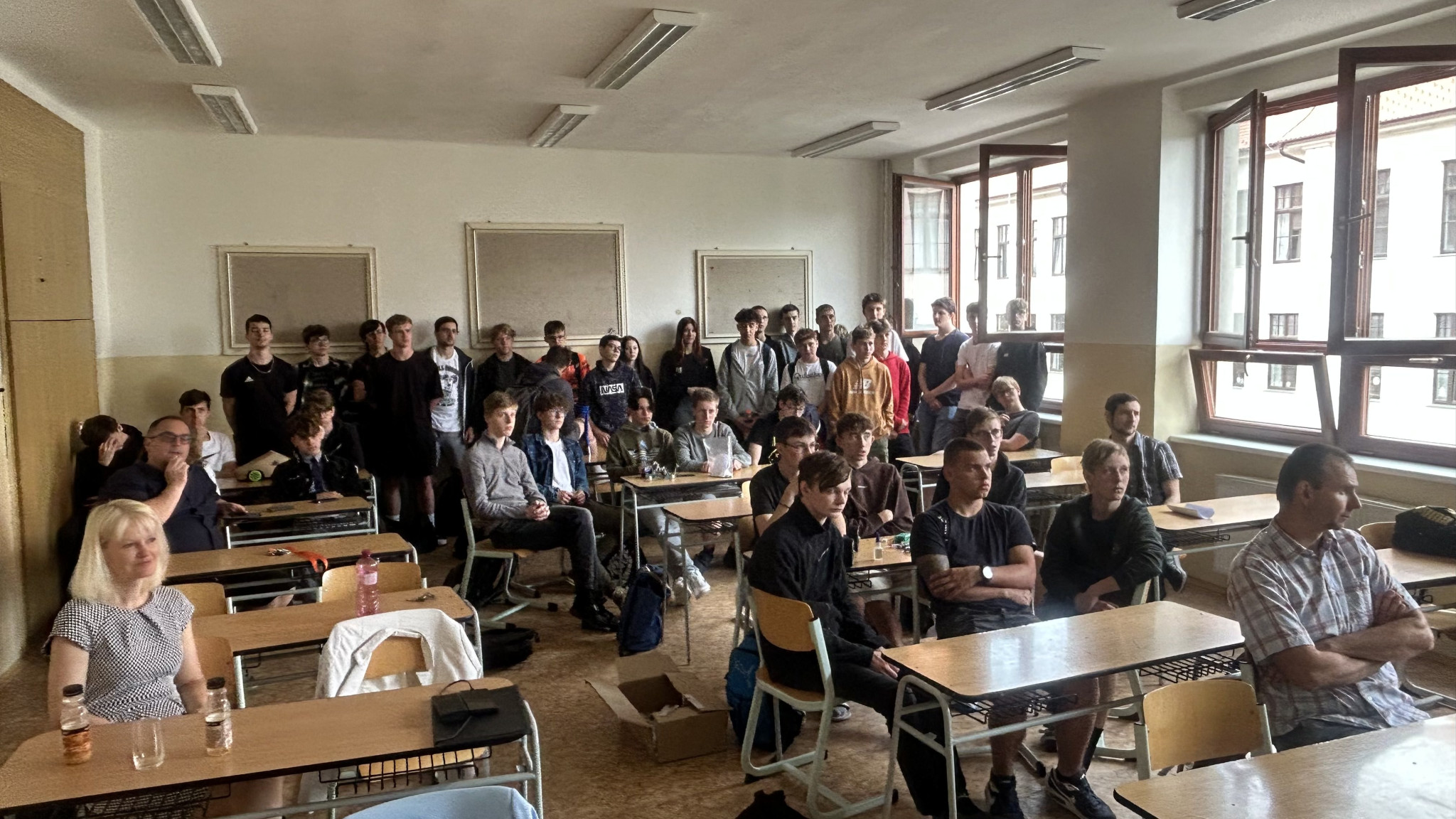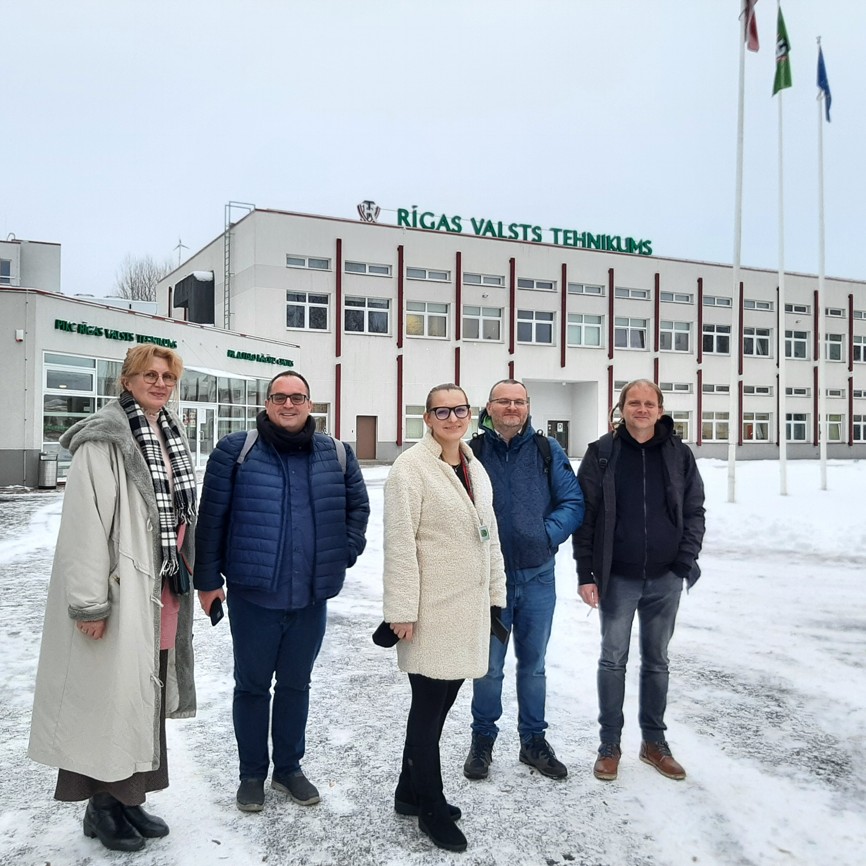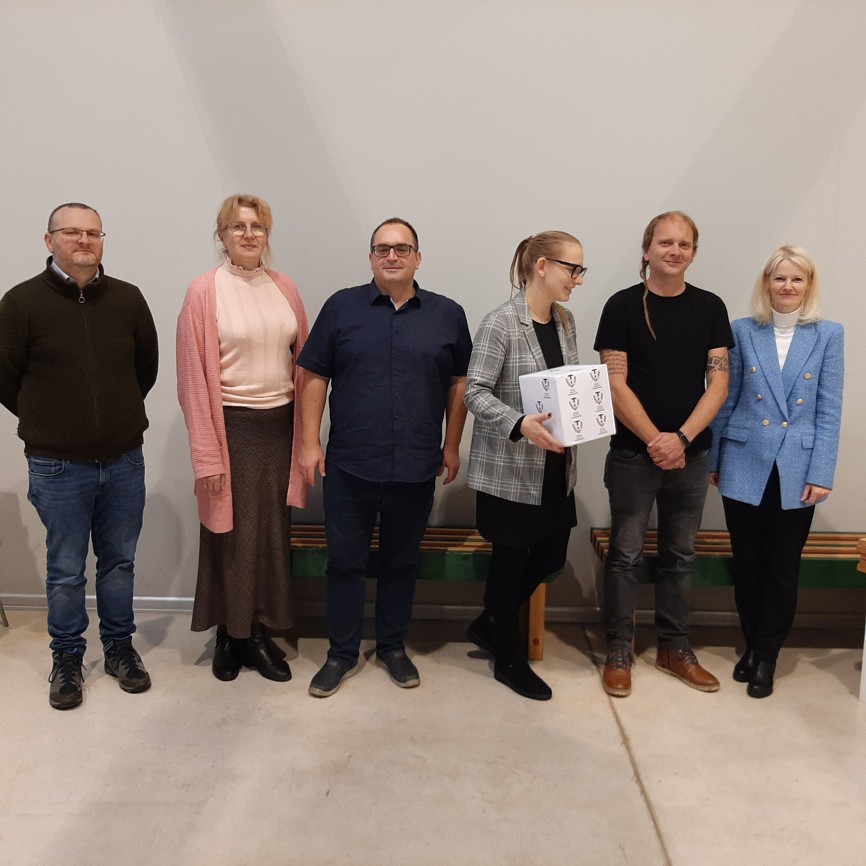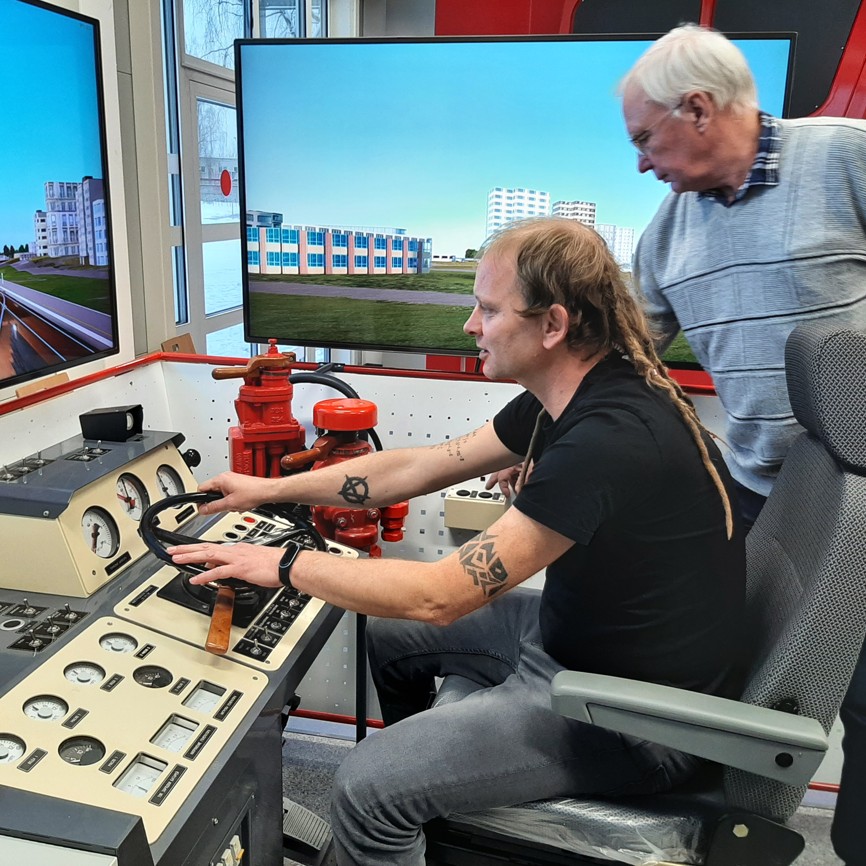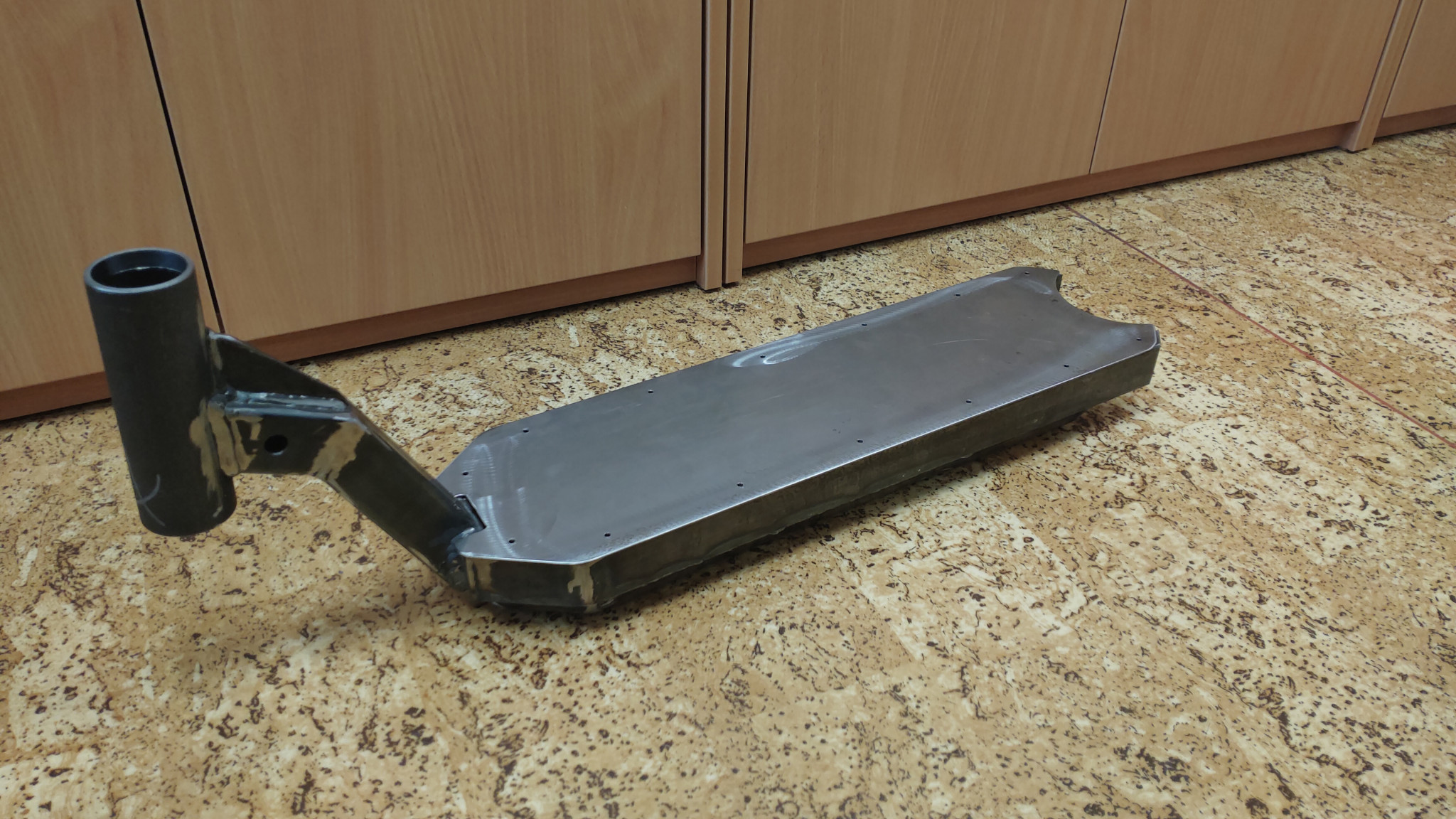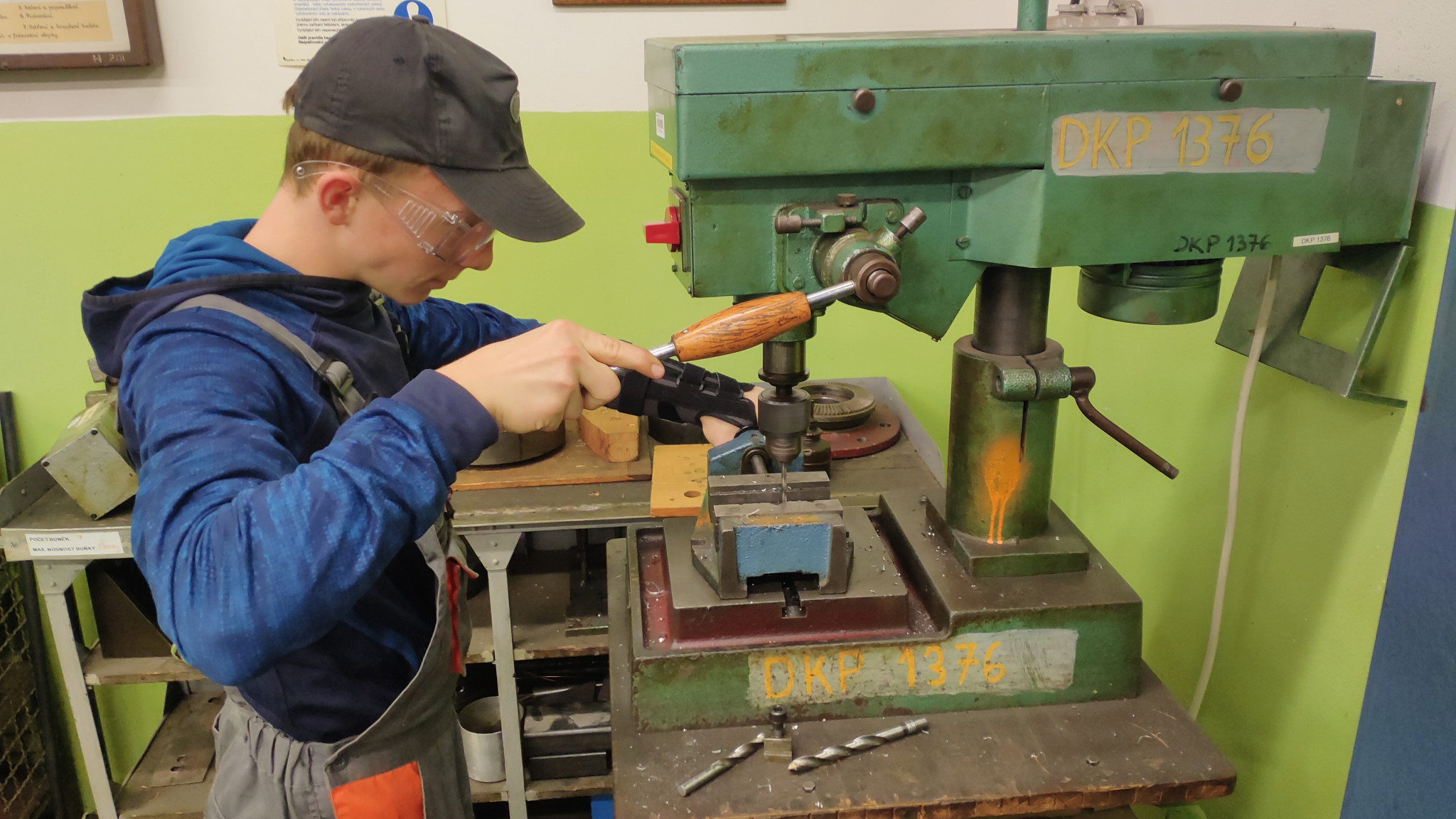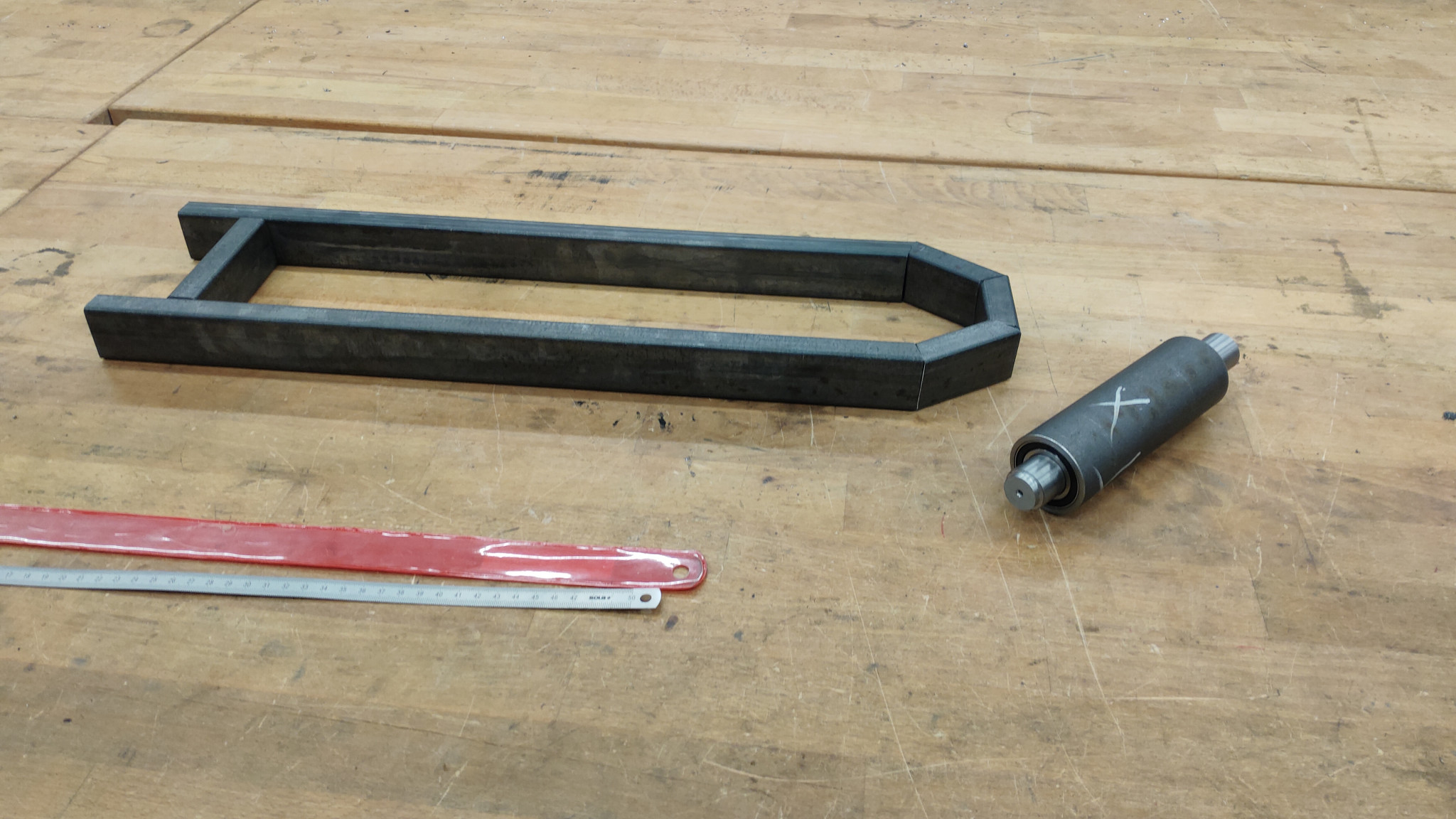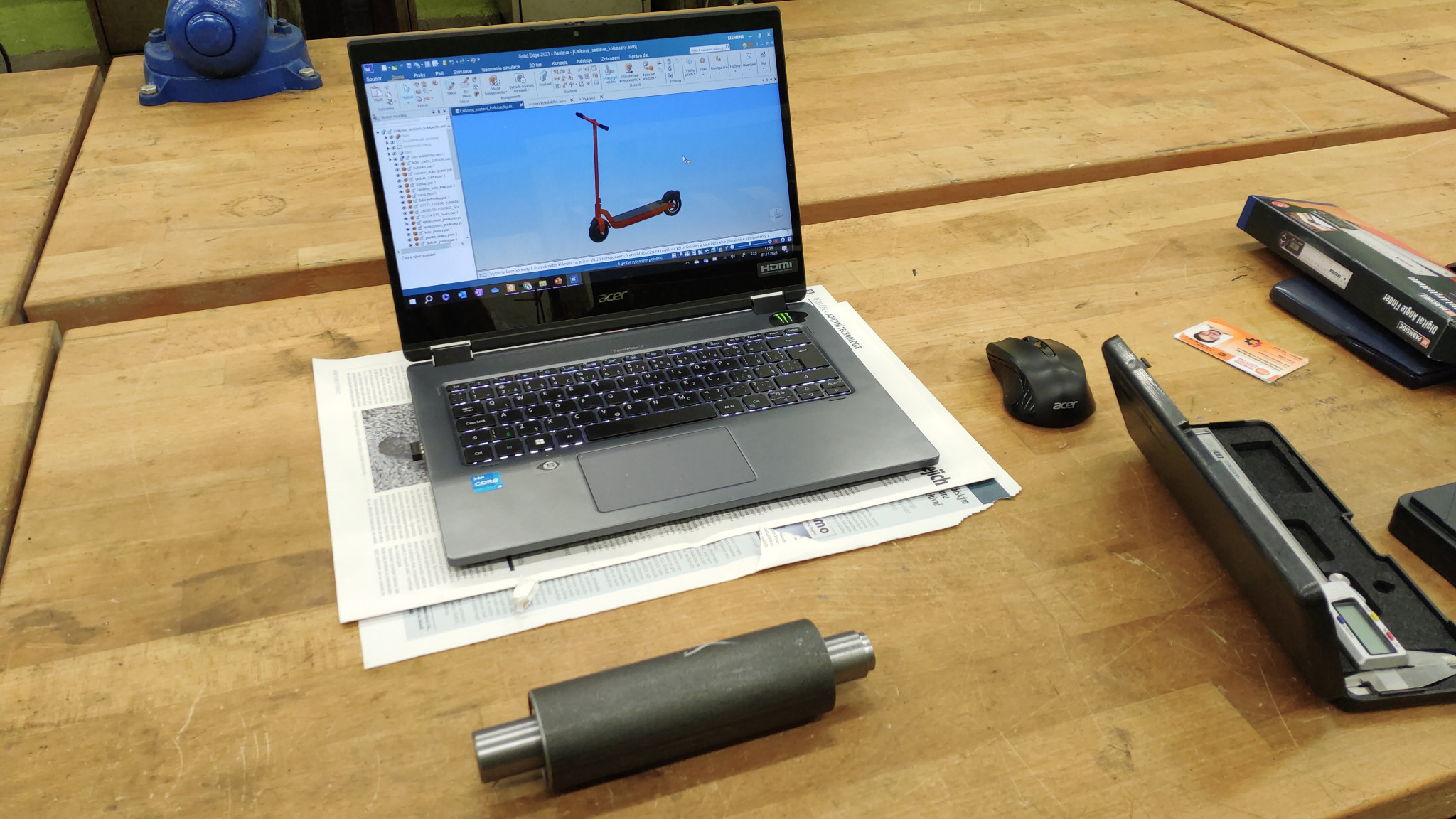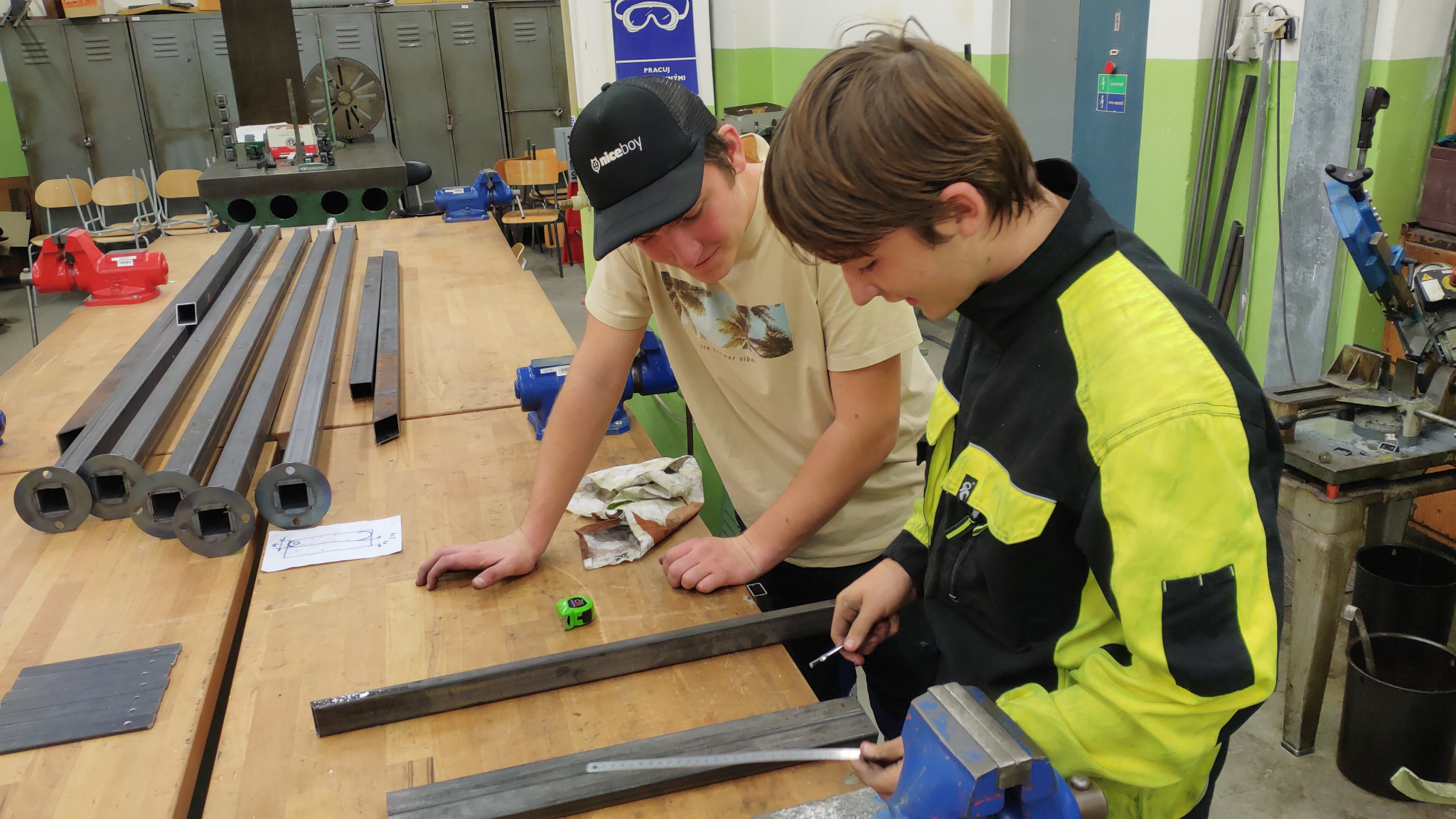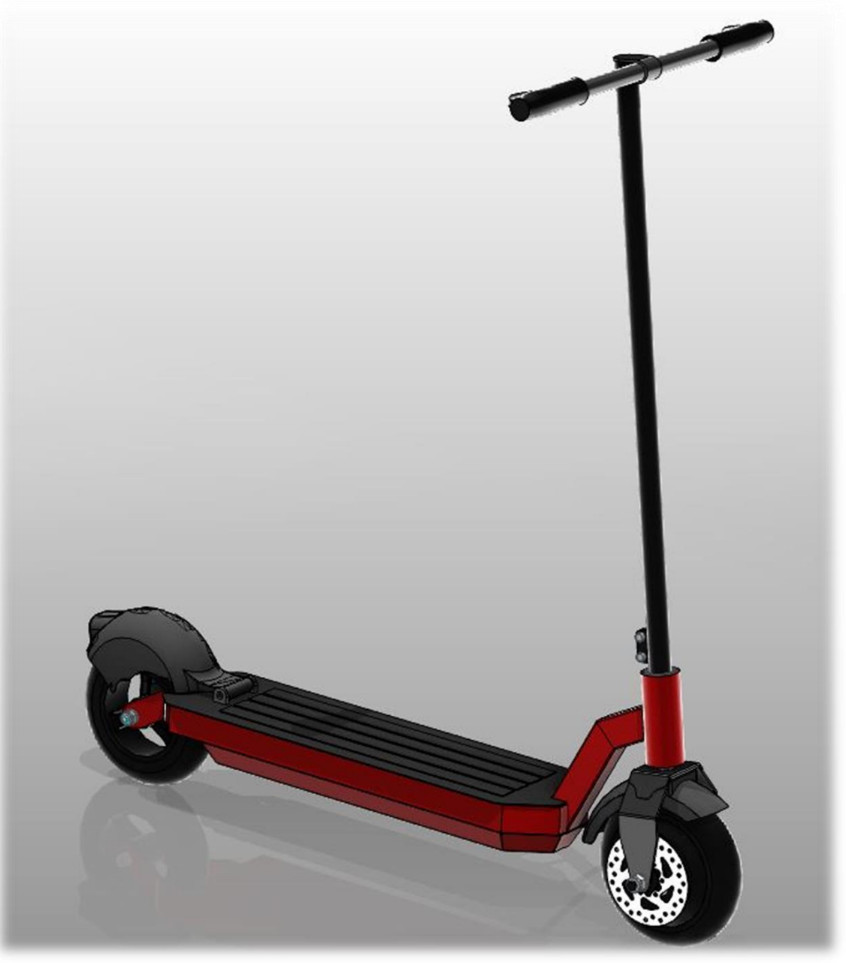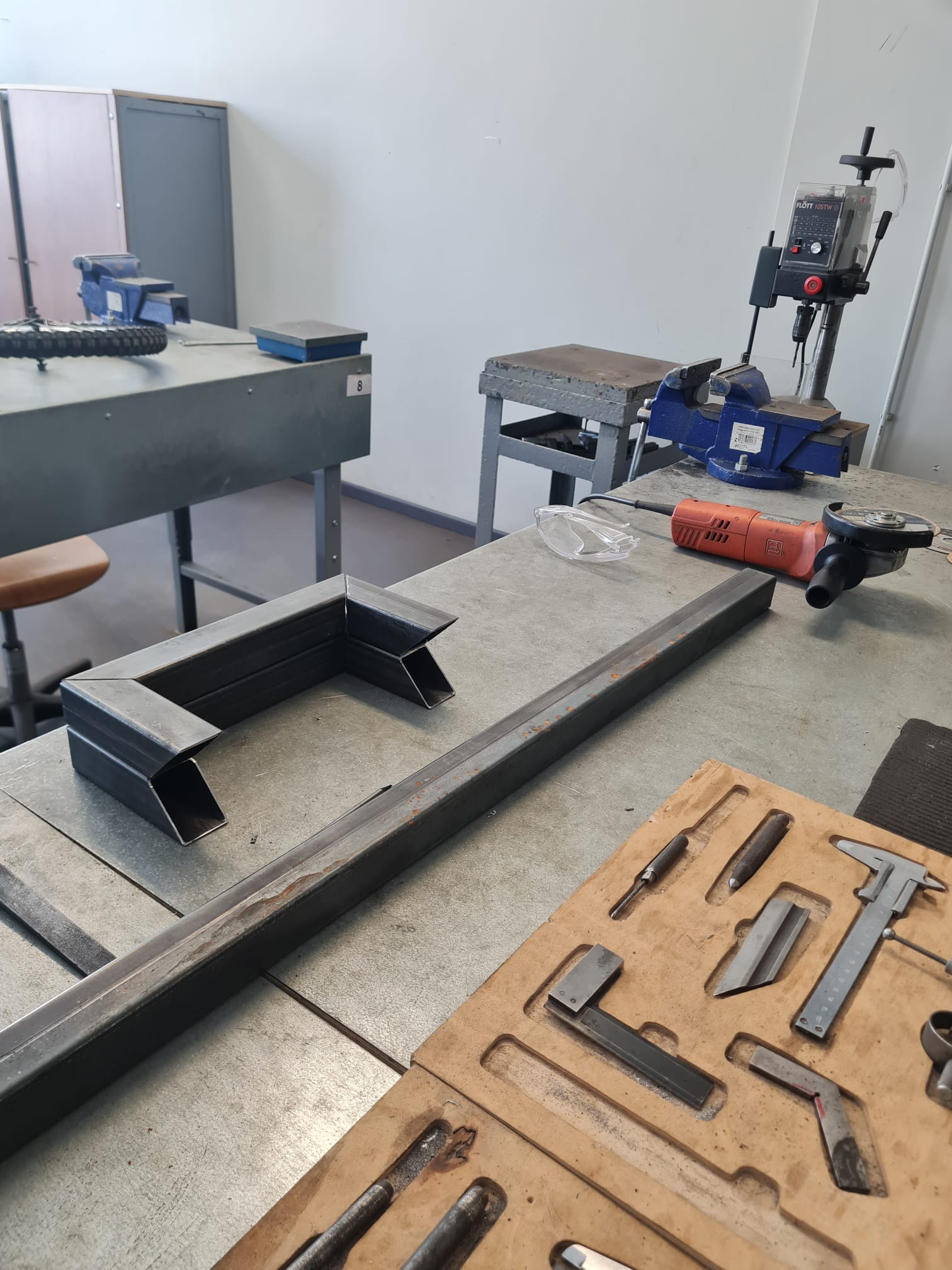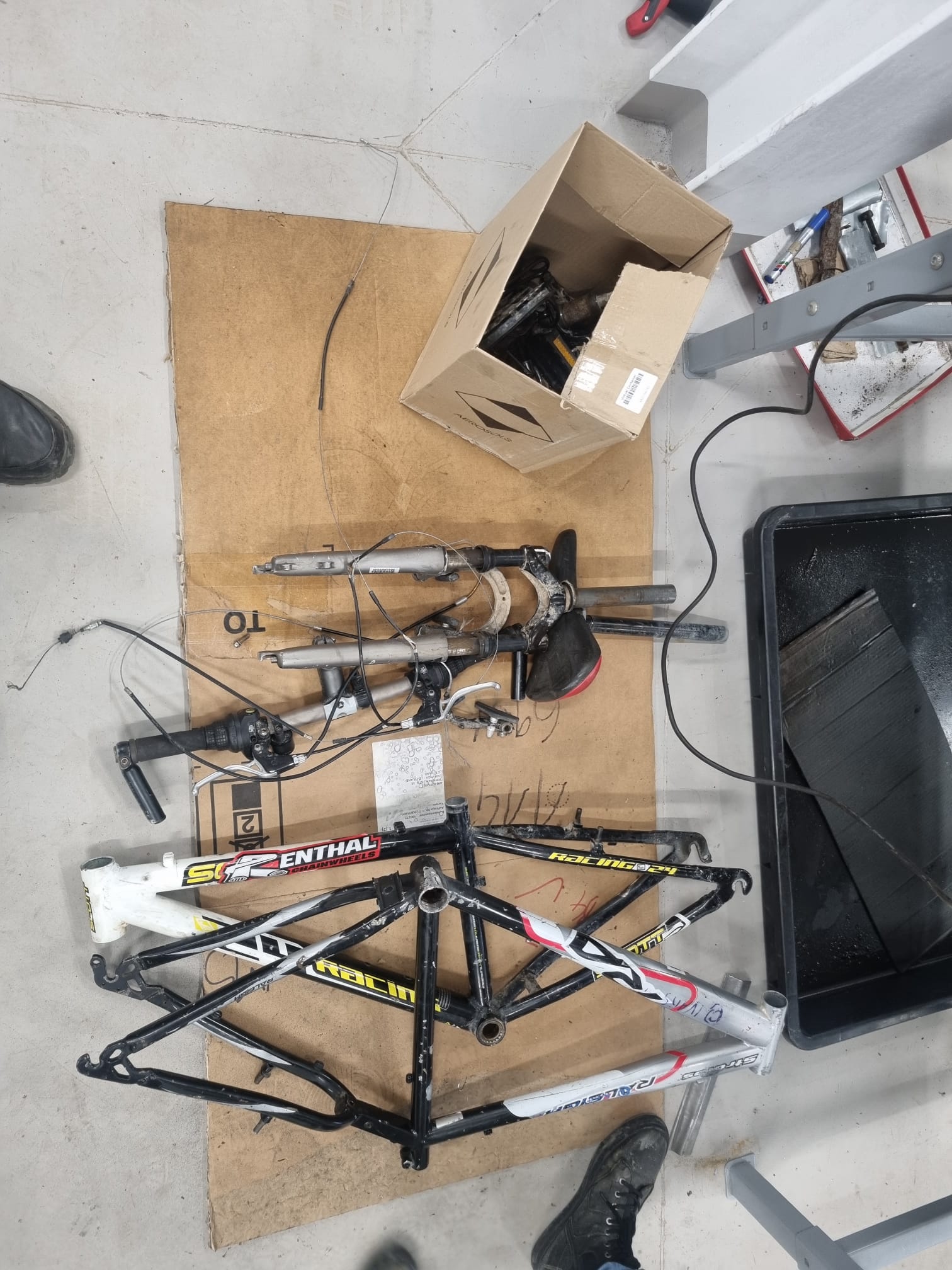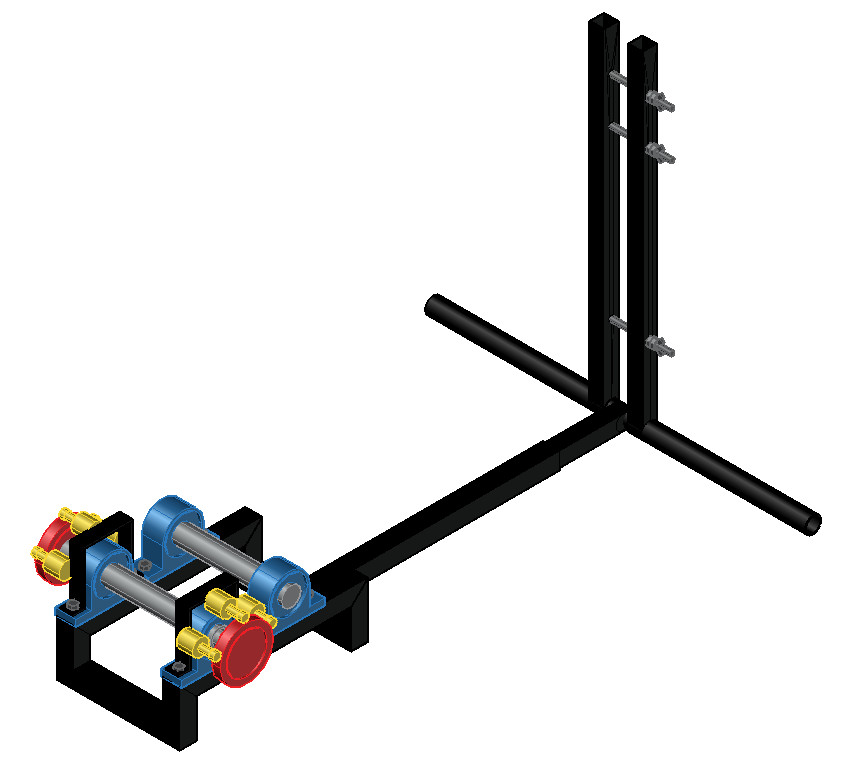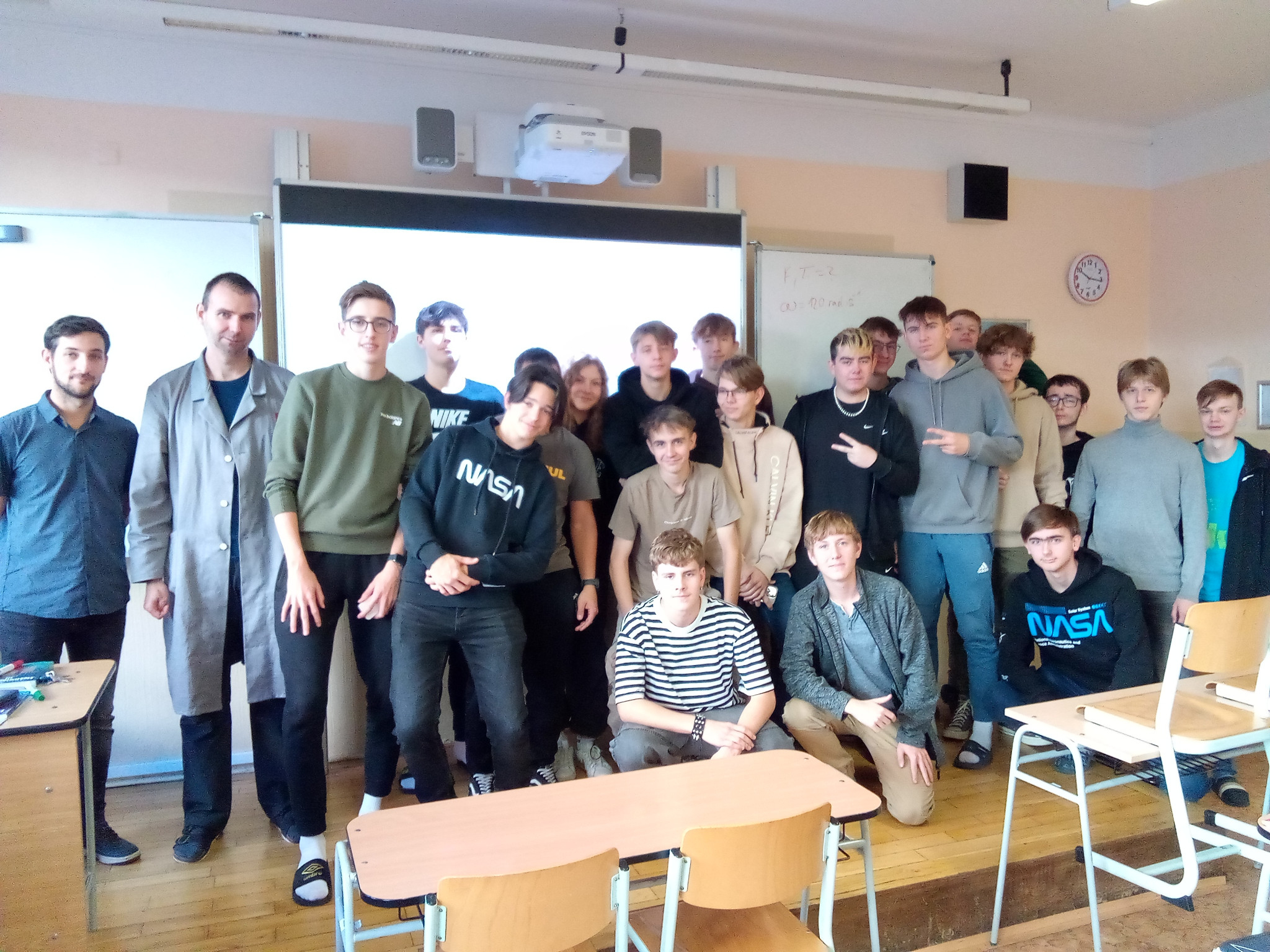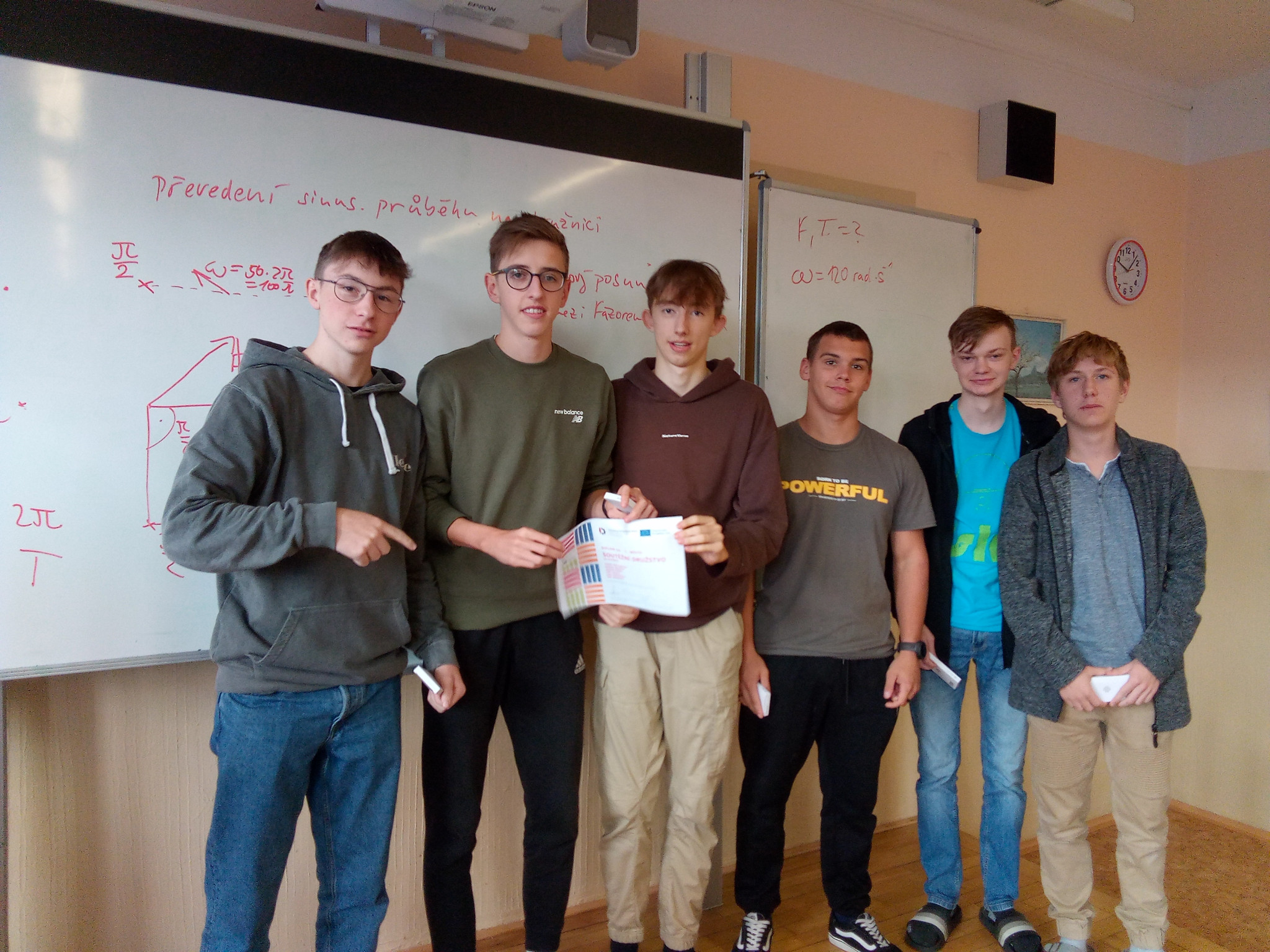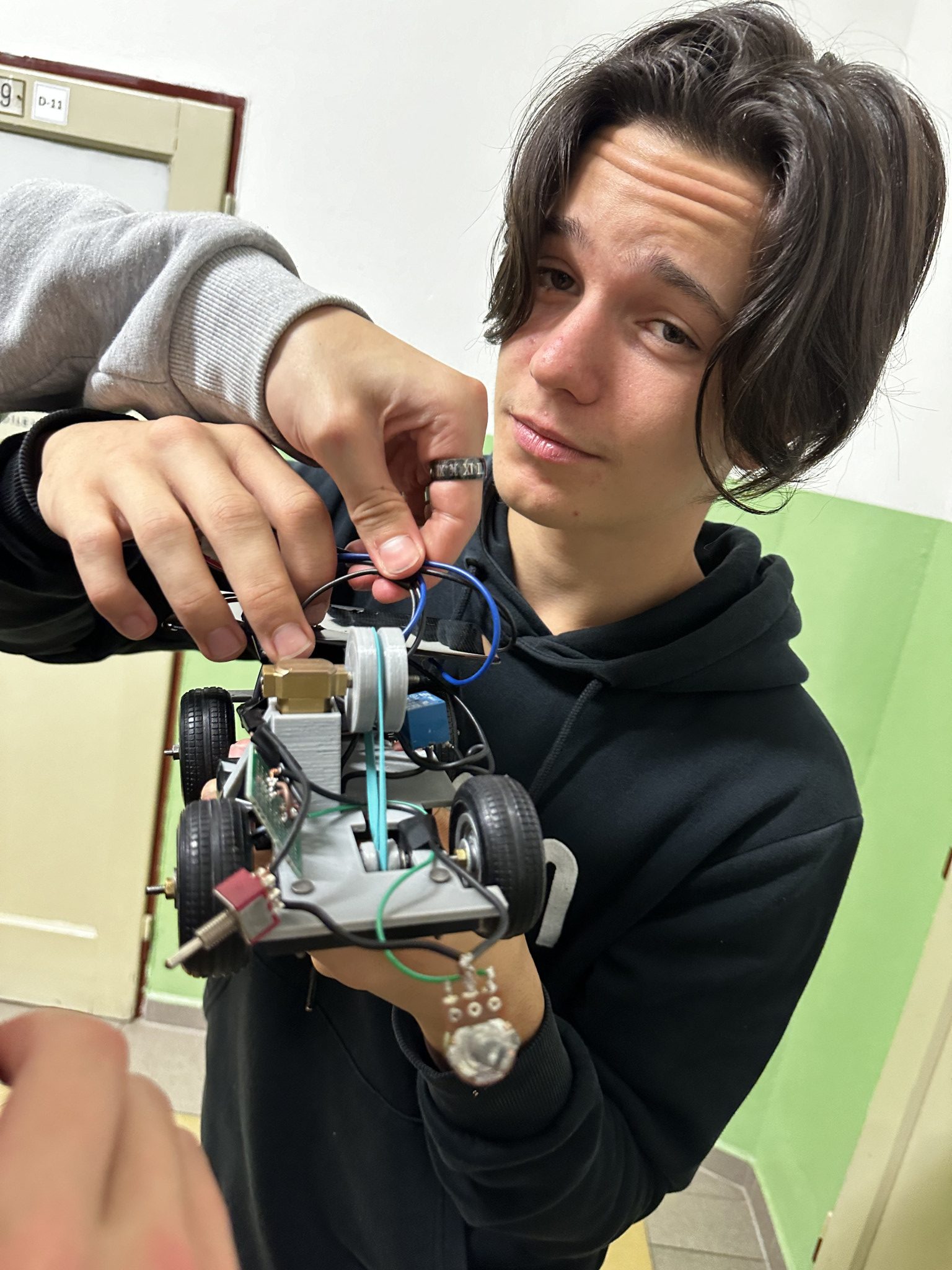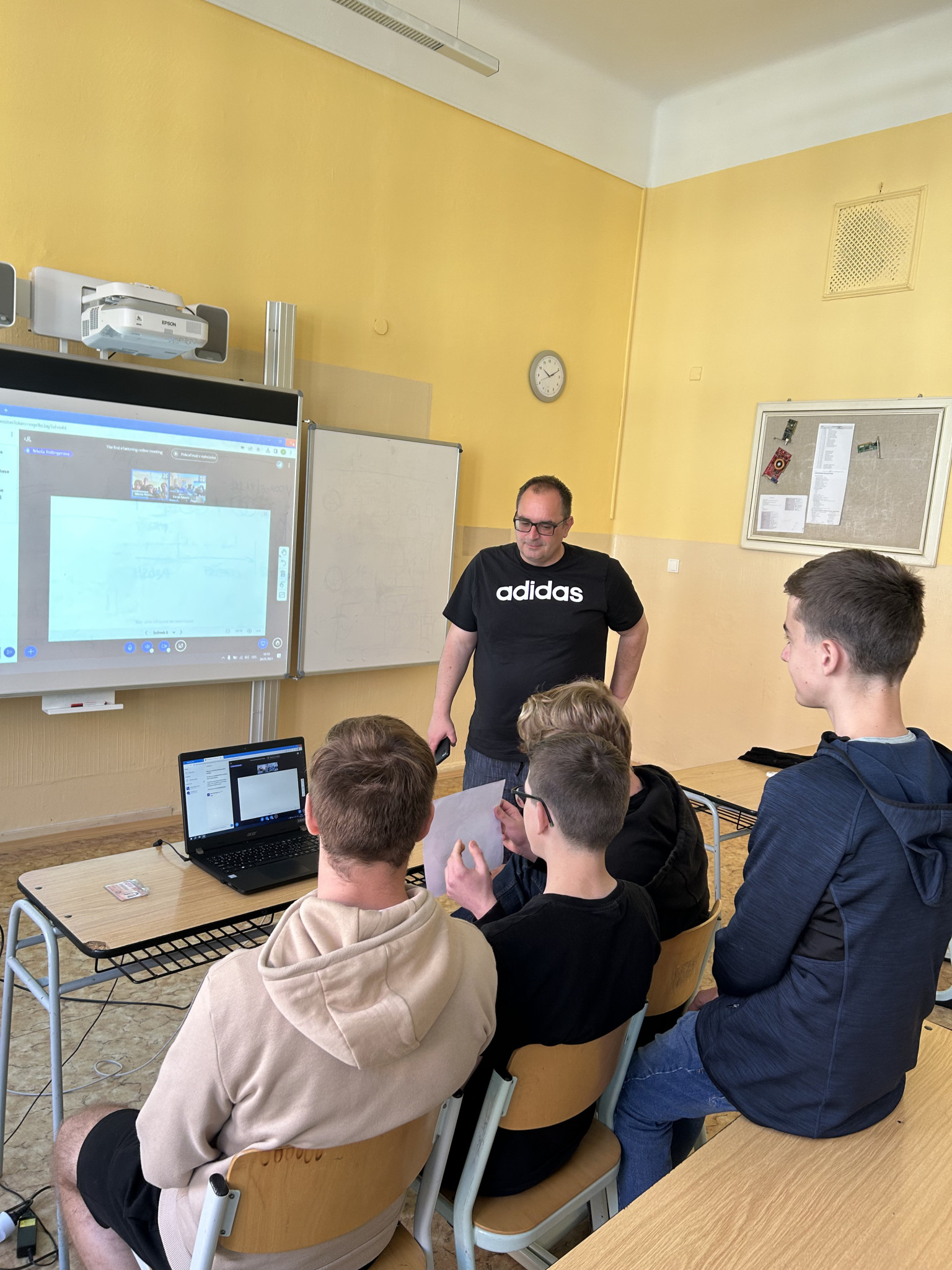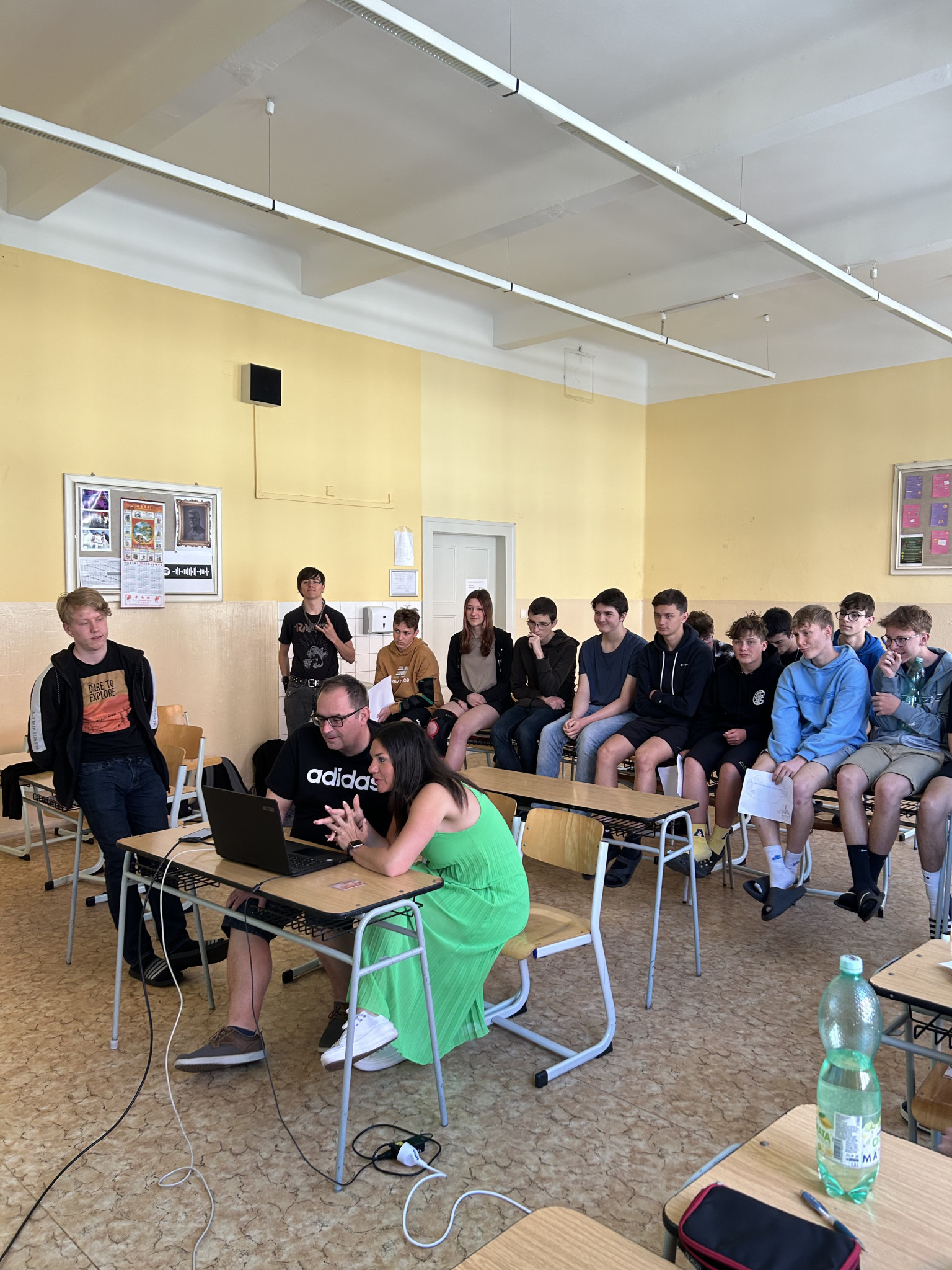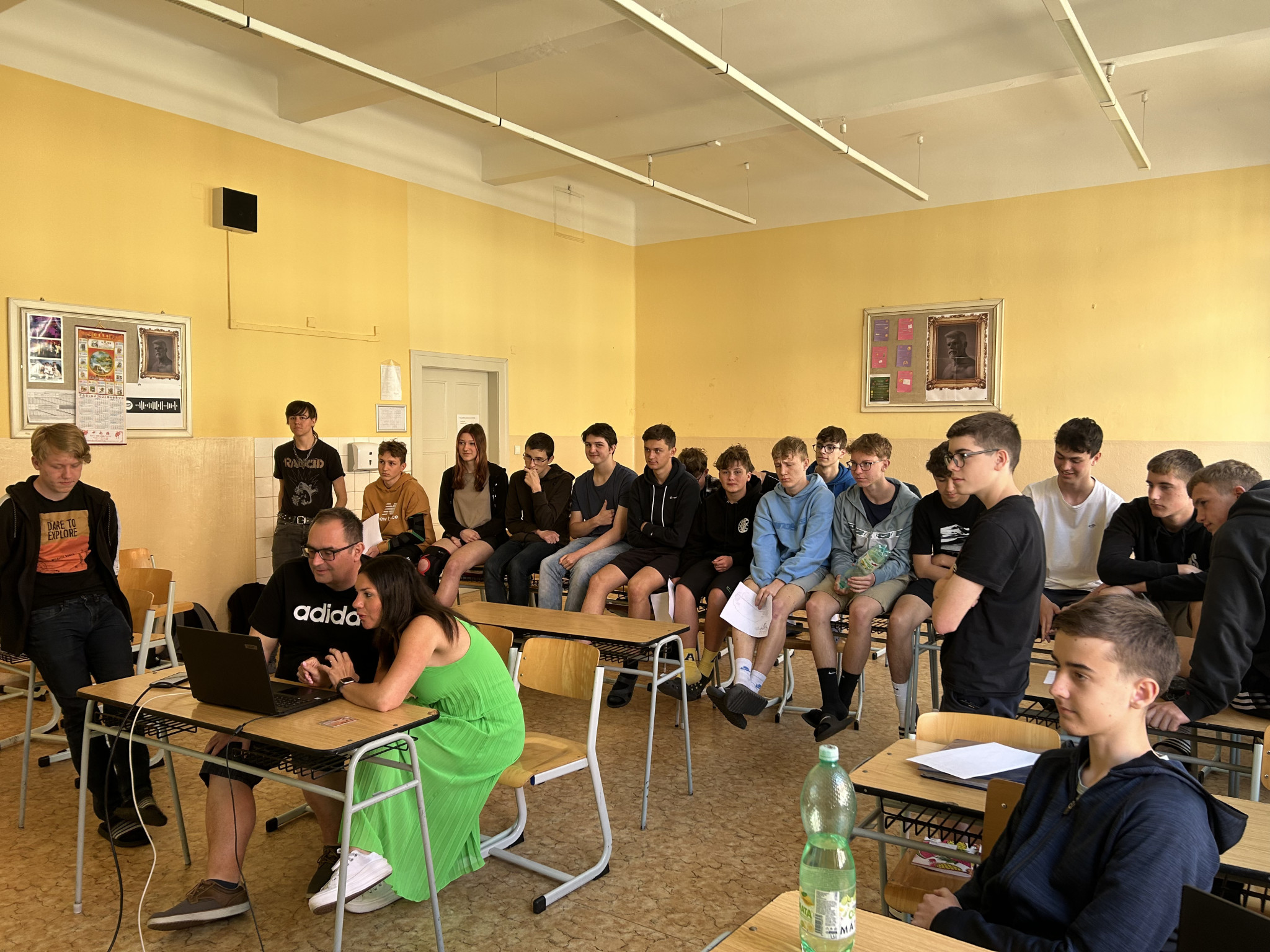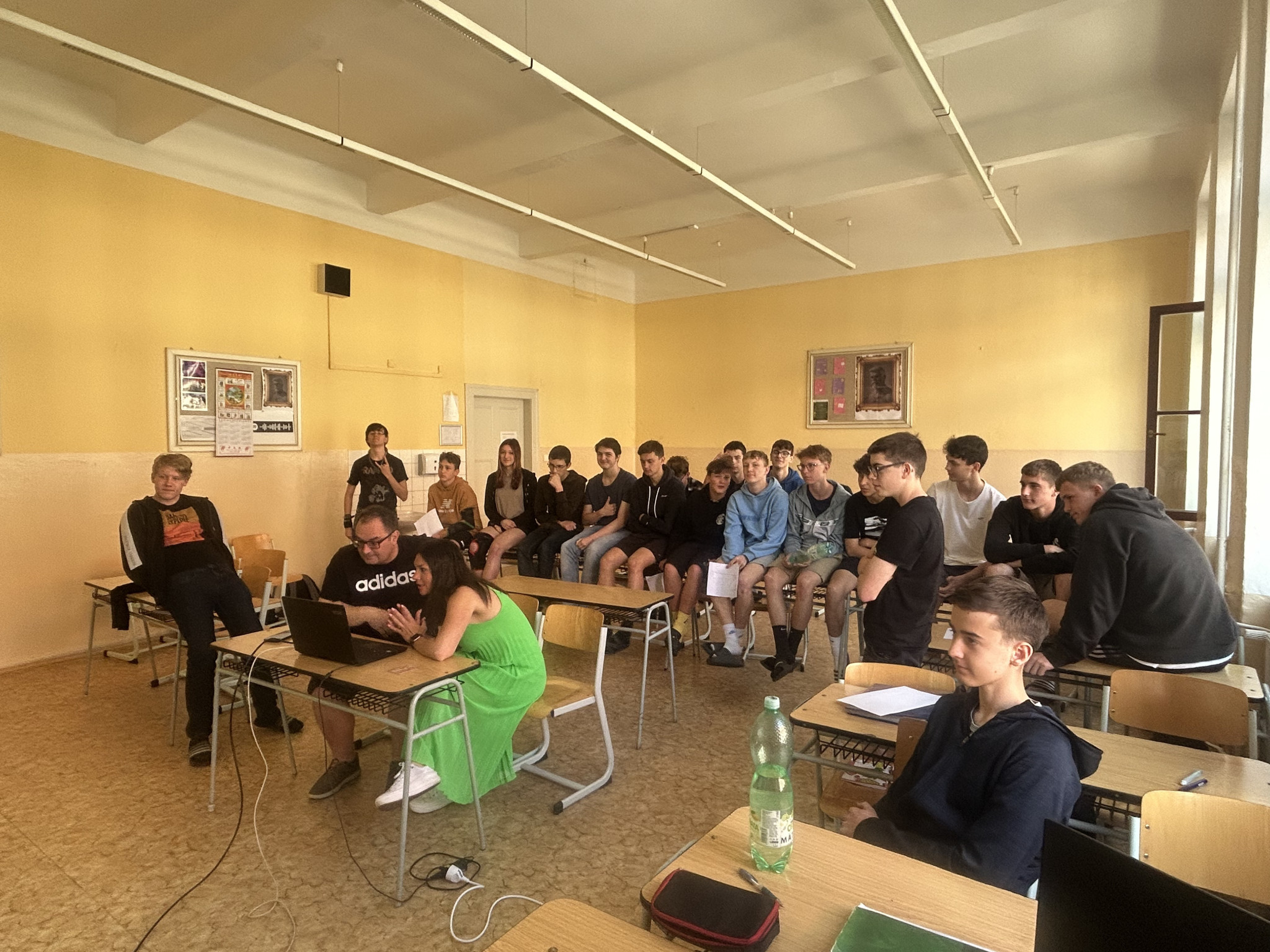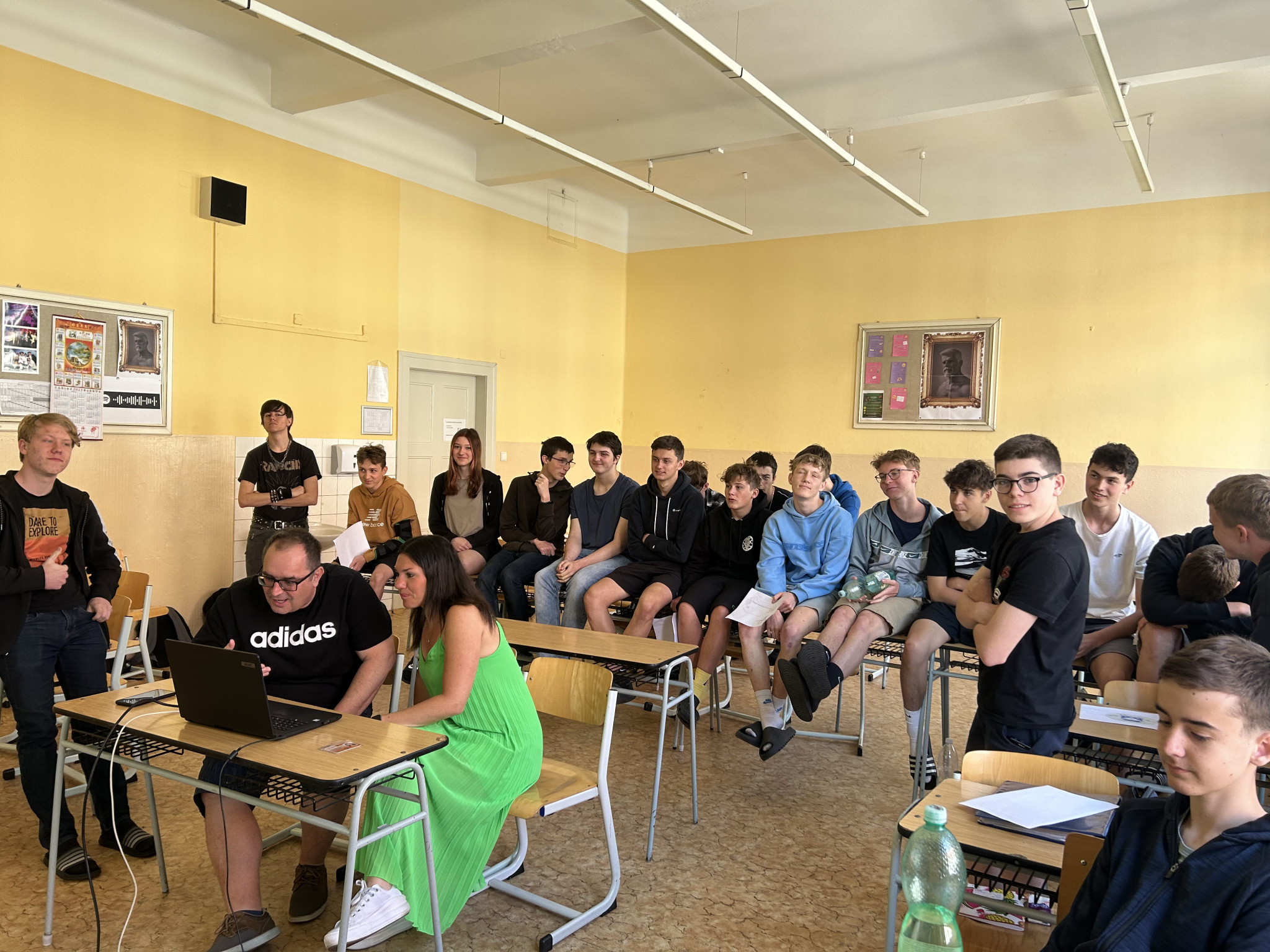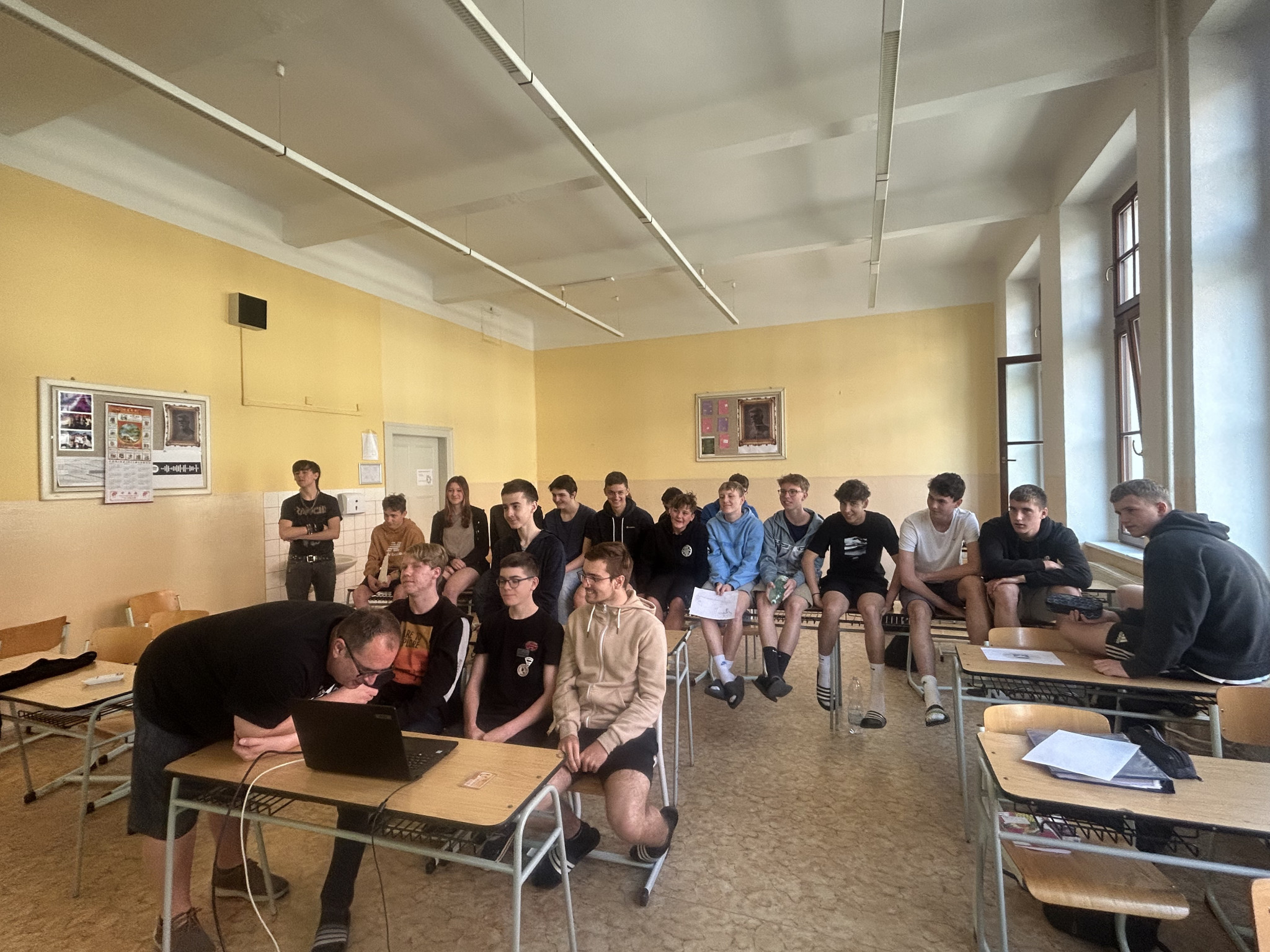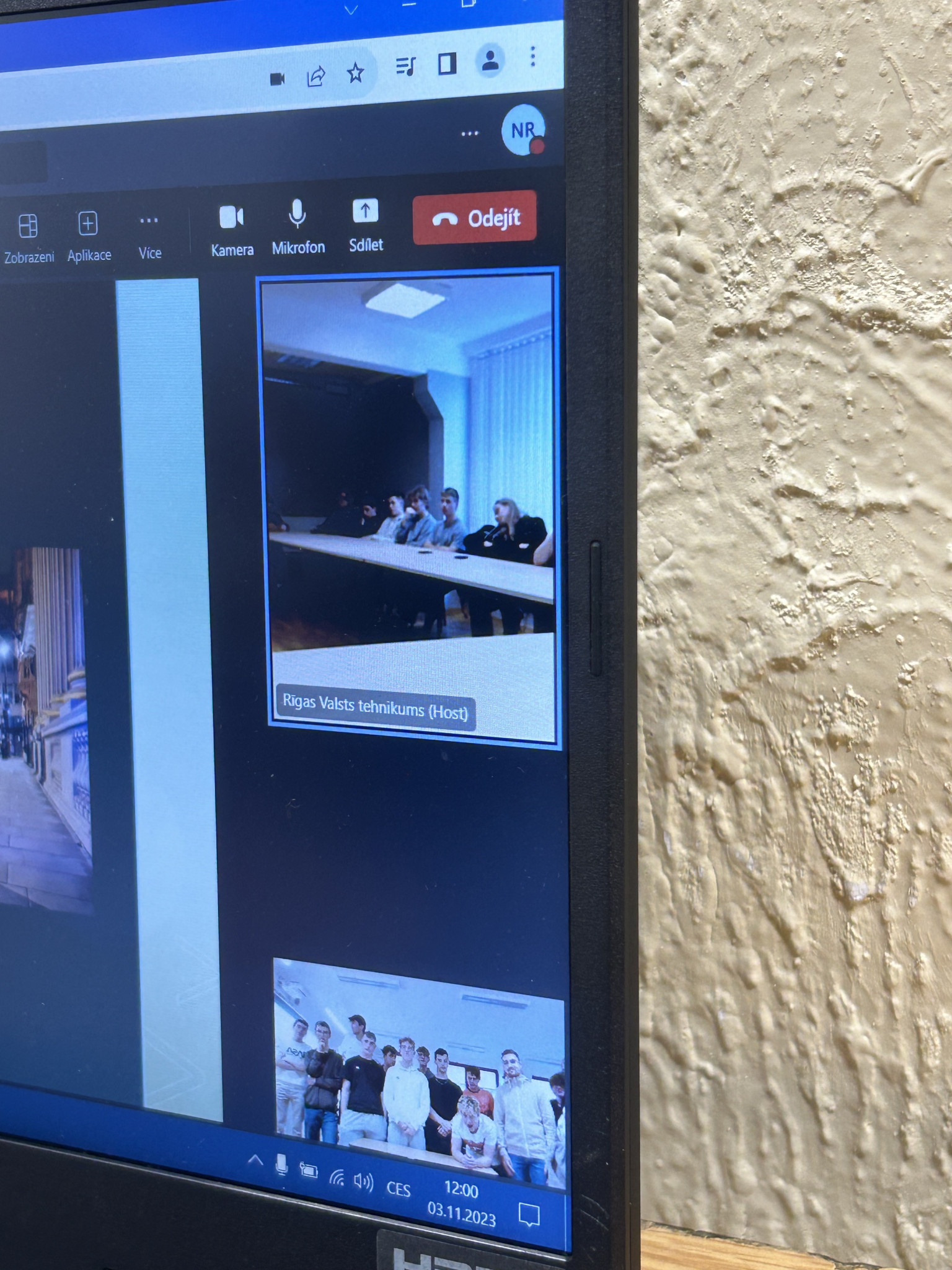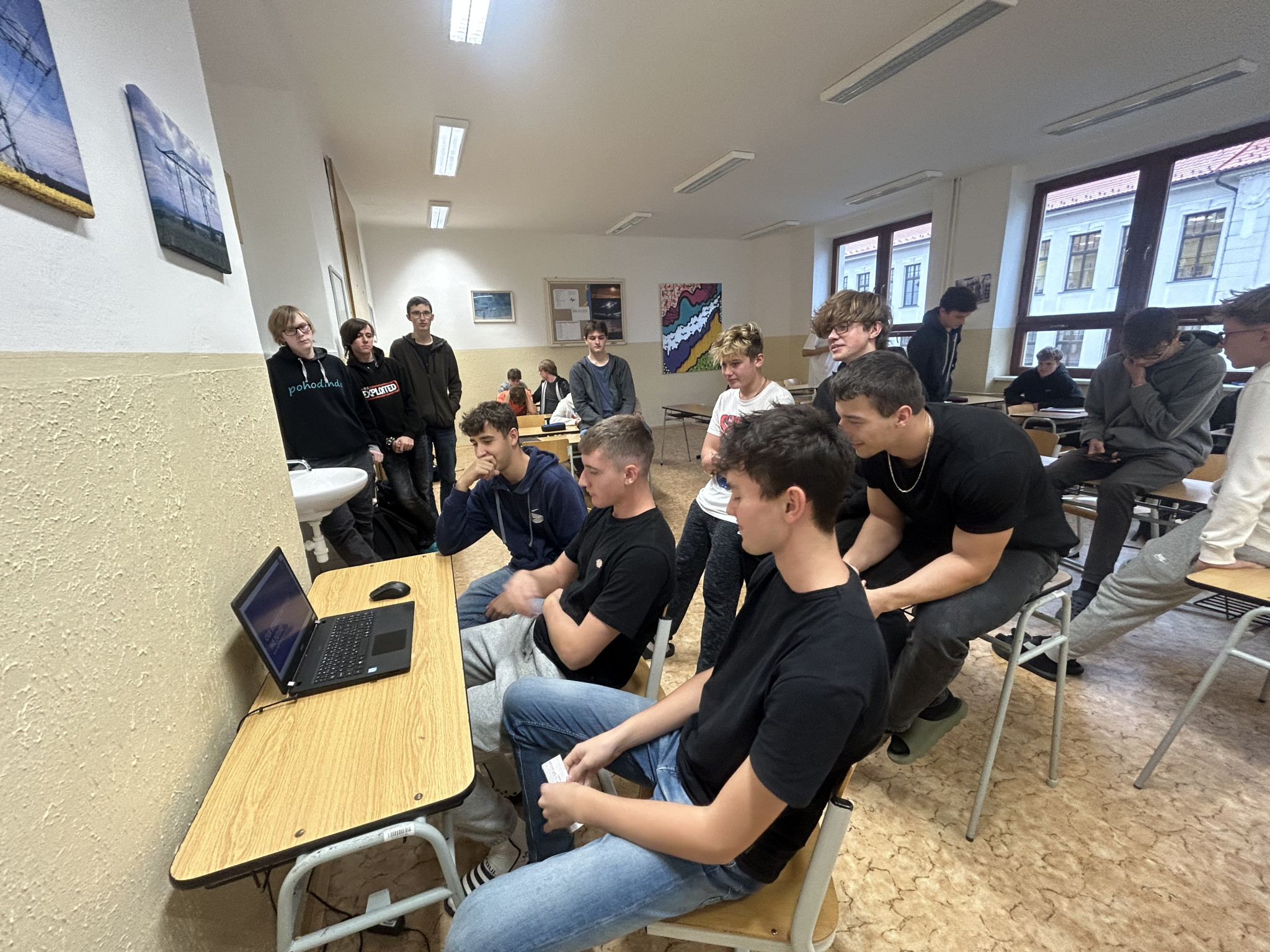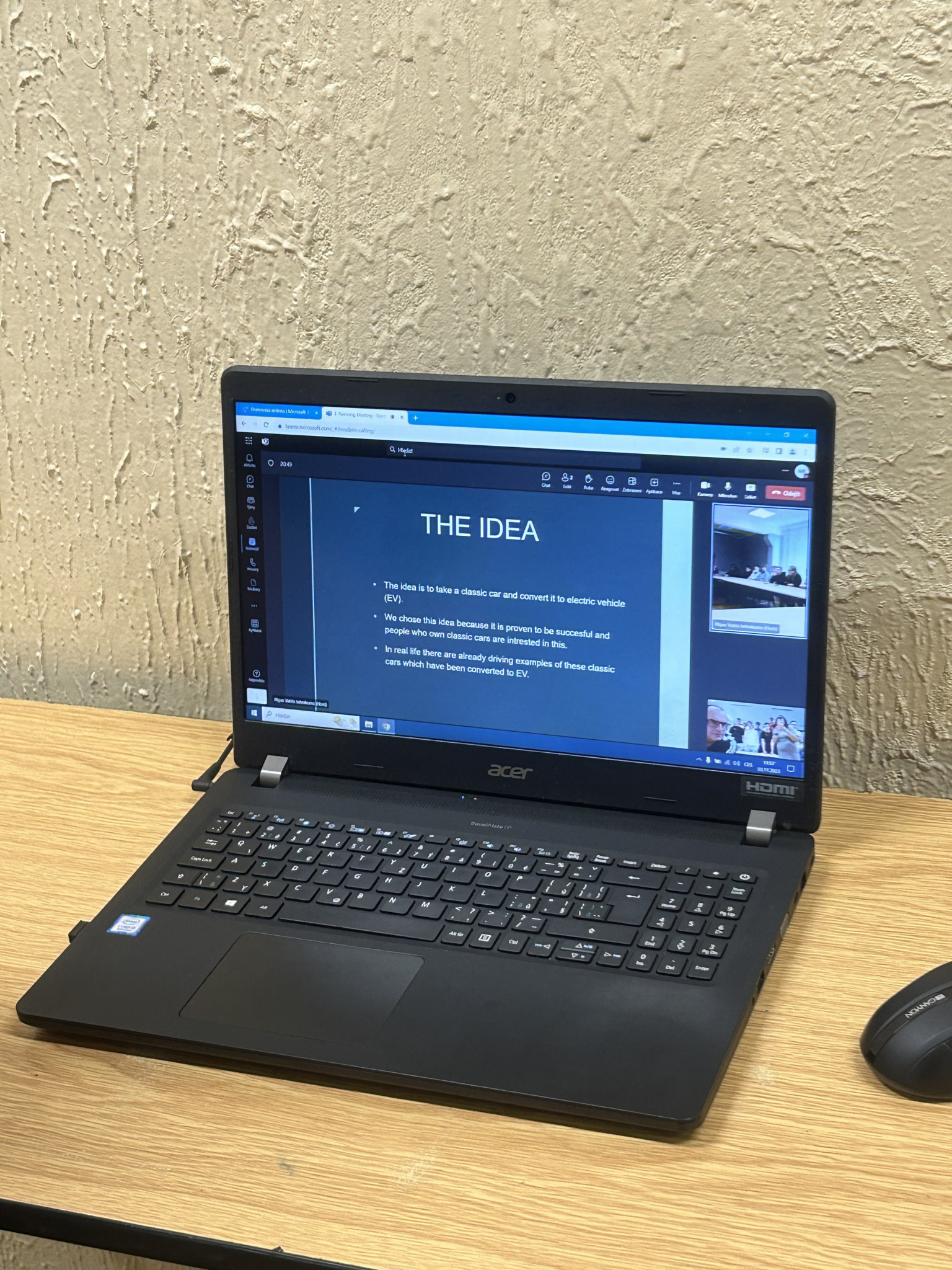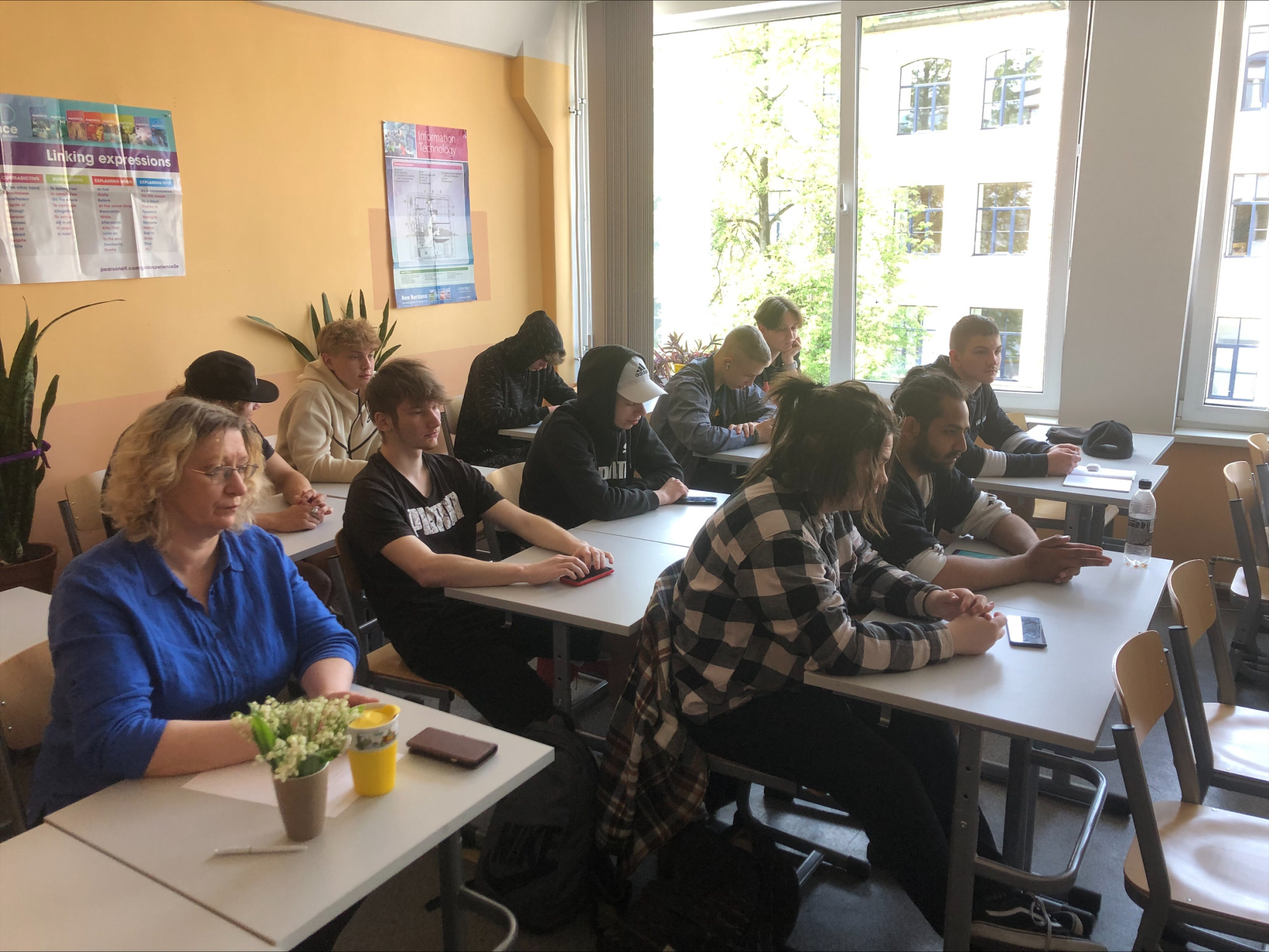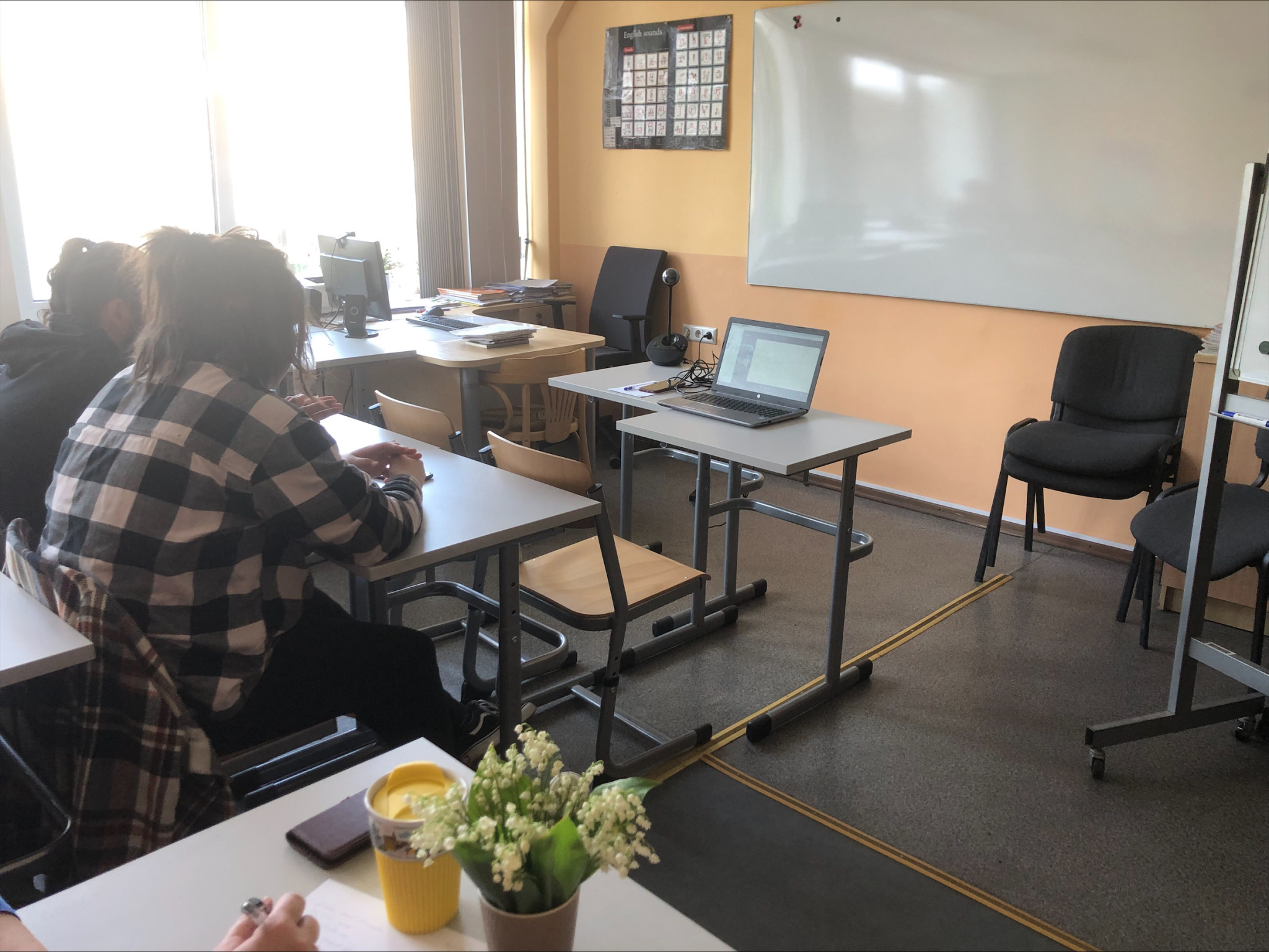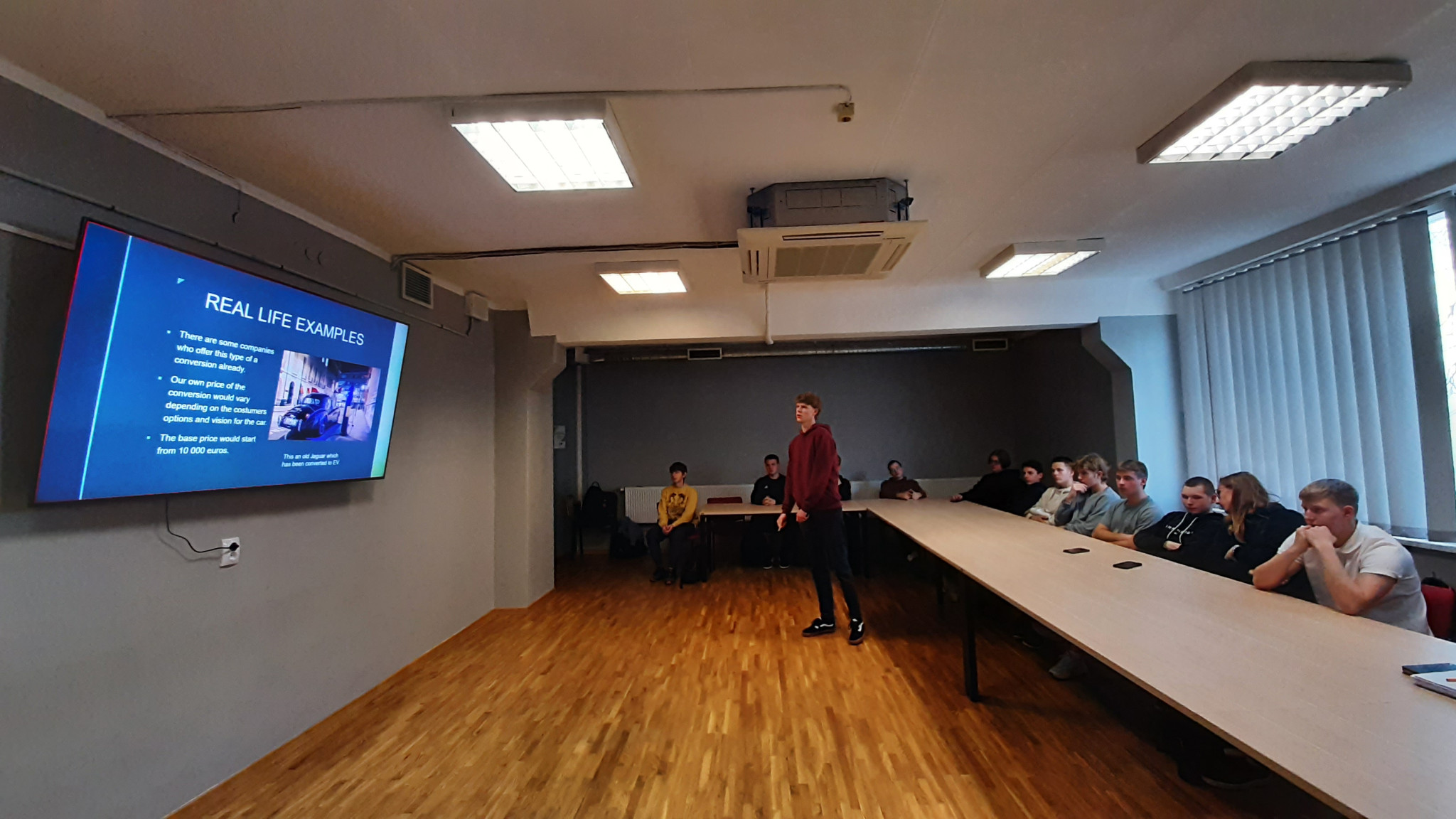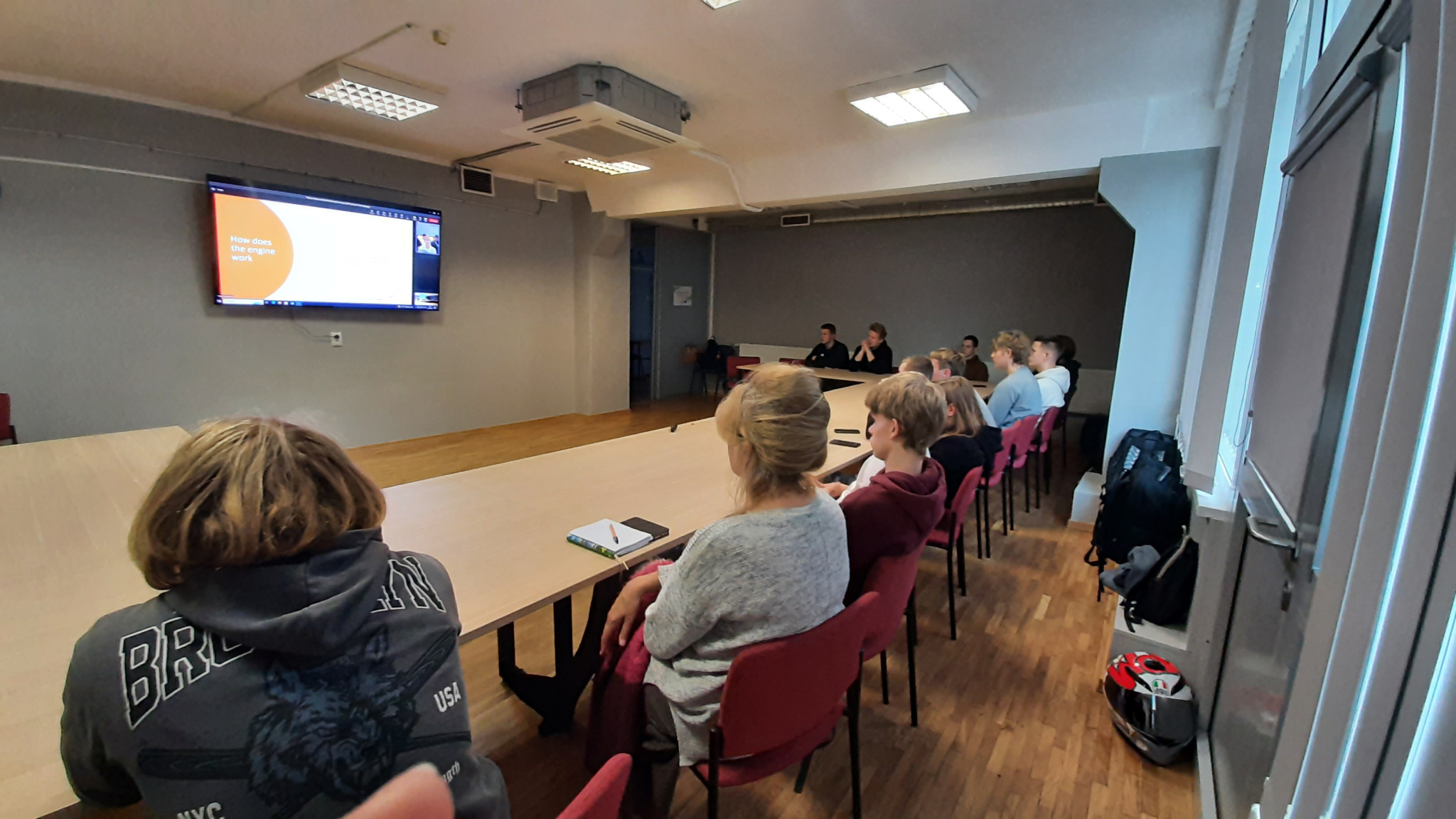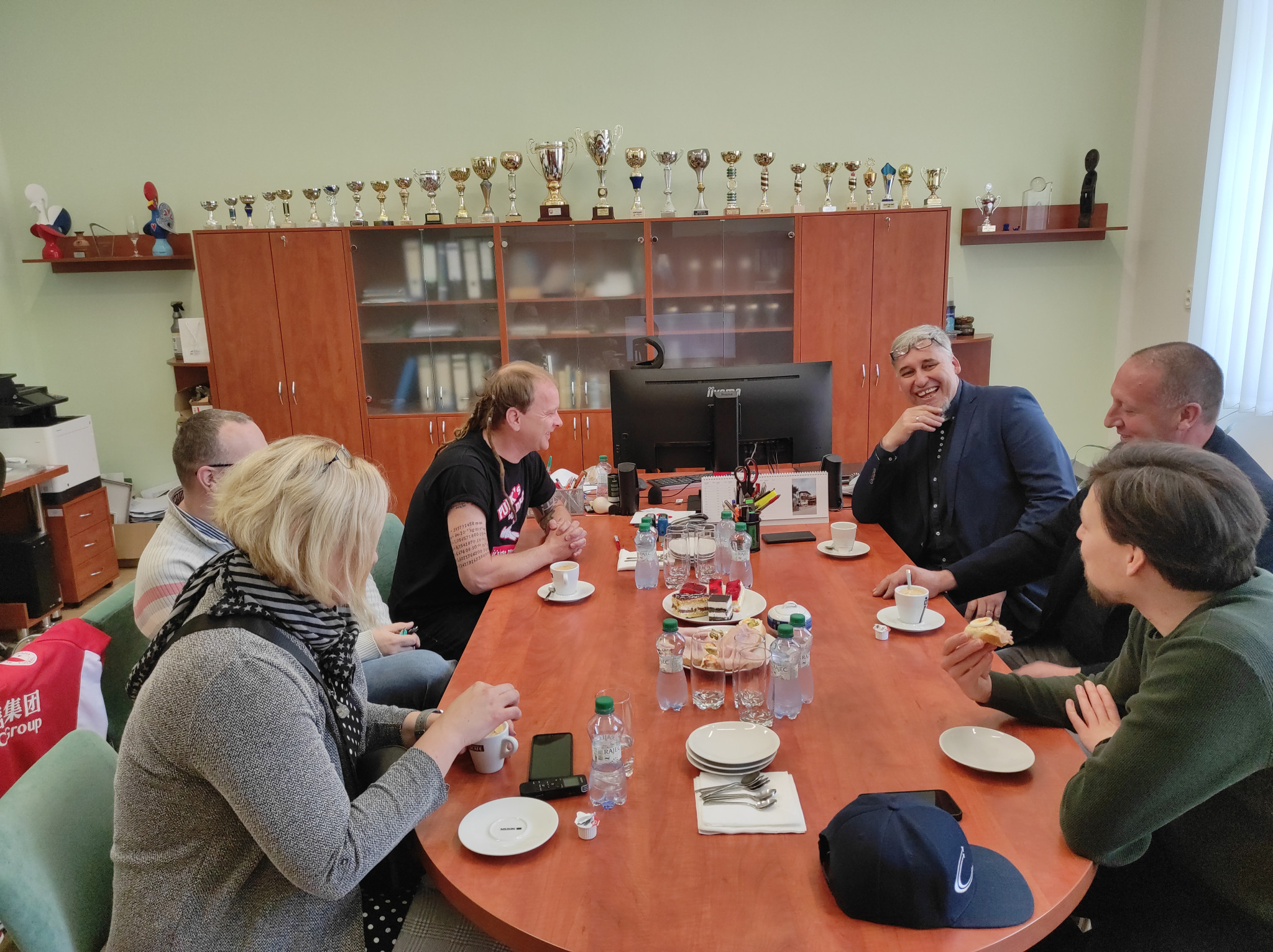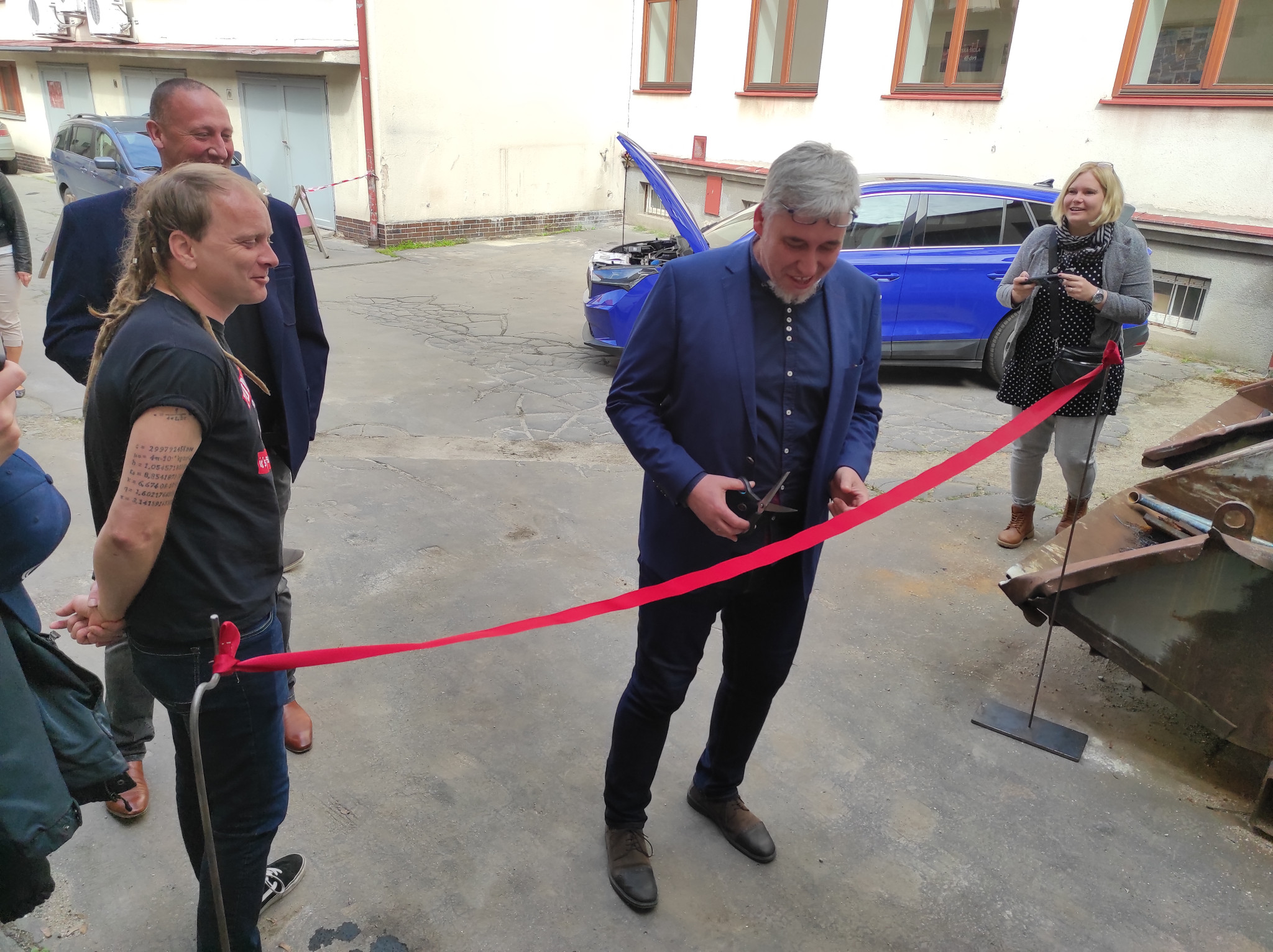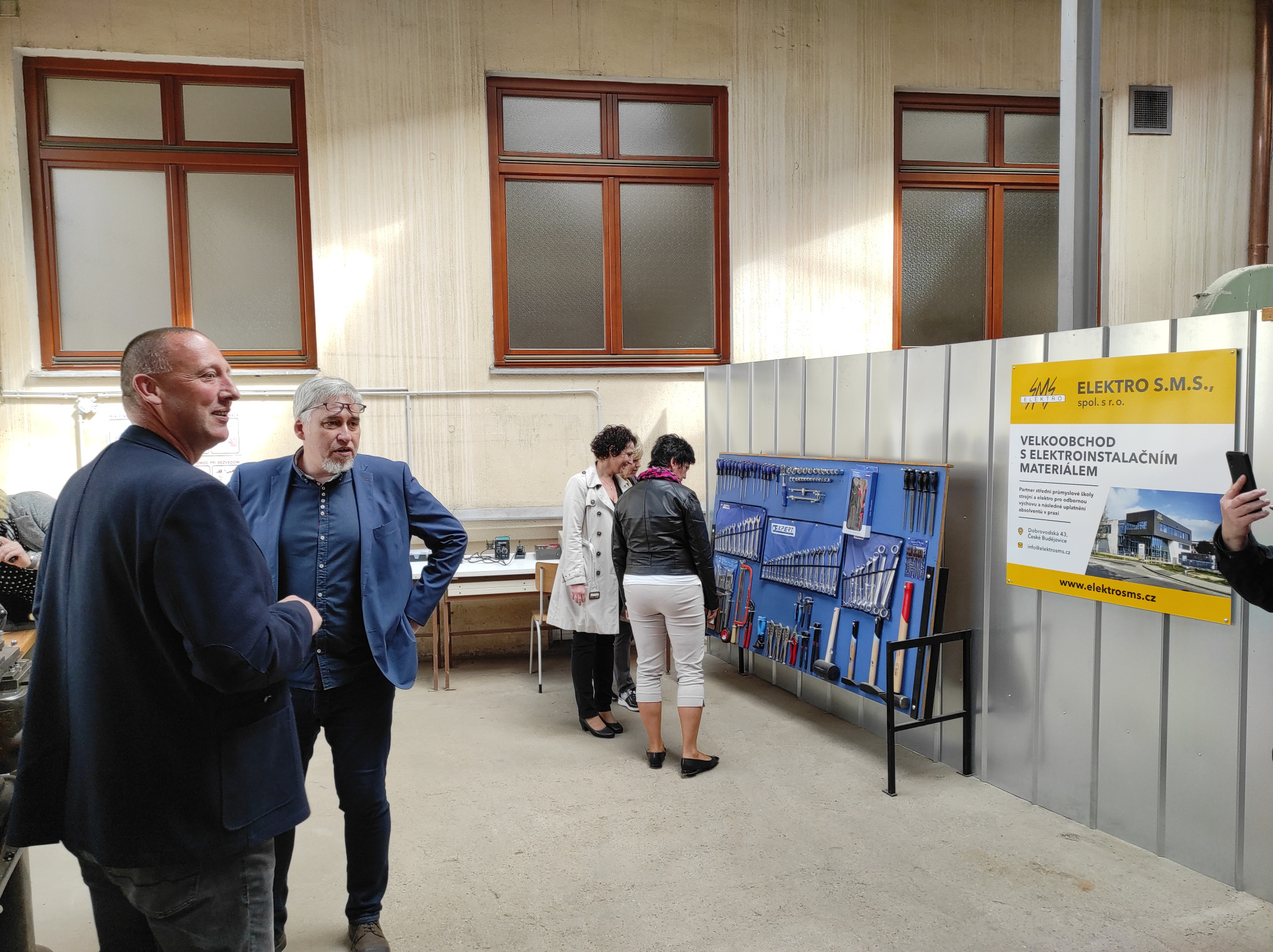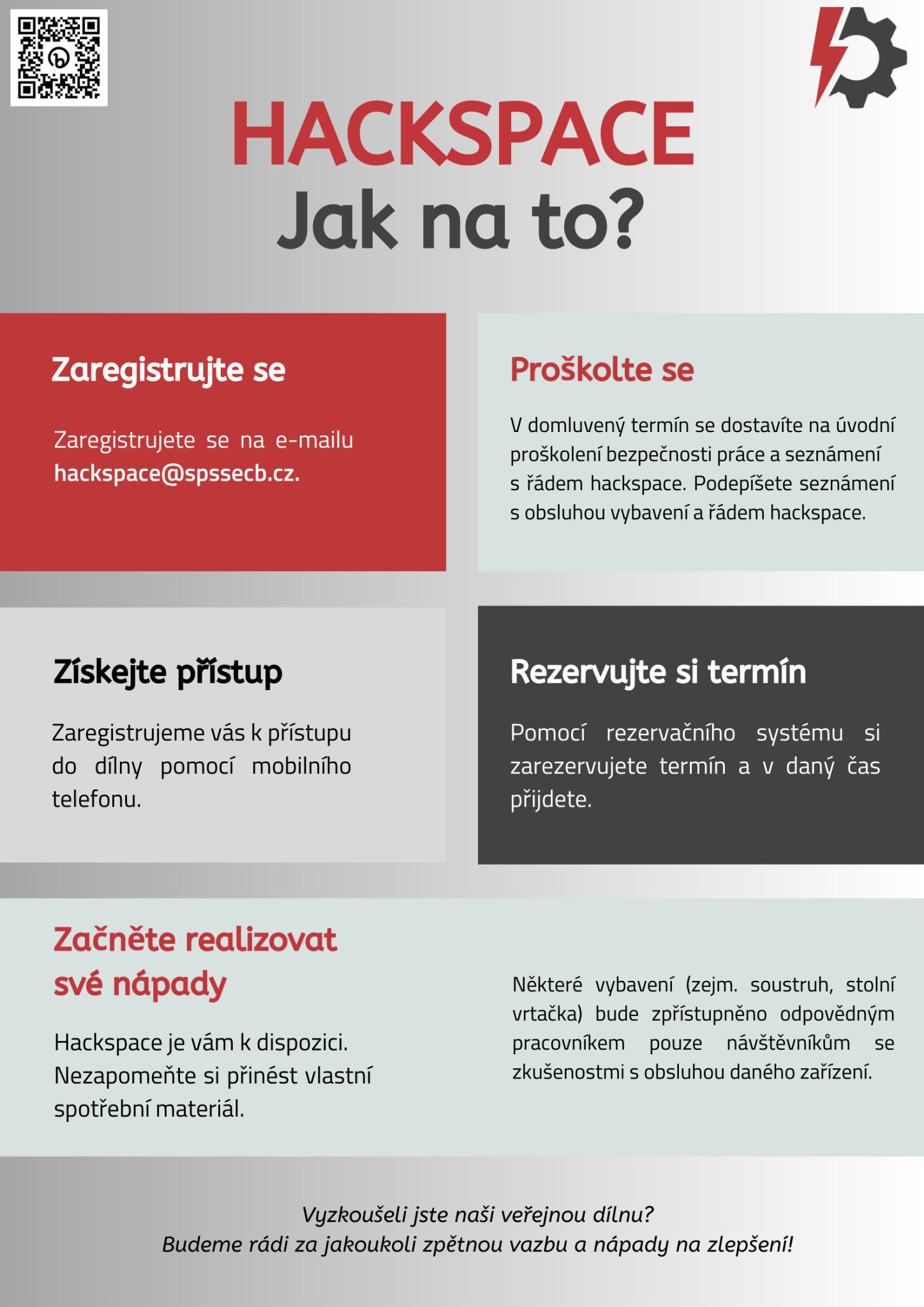KA1 Mobility Accreditation

WP1.1 Kulaté stoly / Round tables
WP1.1.1 Electromobility Round Table (8 June 2023)
On 8 June 2023, the Round Table on Electromobility took place in the framework of the Erasmus+ programme (project name: 2022-1-CZ01-KA210-VET-000082444 Future Transport, Sustainable Transport, Electromobility, Education for the Future).
On 8 June 2023, the Round Table on Electromobility took place in the framework of the Erasmus+ programme (project name: 2022-1-CZ01-KA210-VET-000082444 Future Transport, Sustainable Transport, Electromobility, Education for the Future).
The whole event started with an introductory speech by our director (Mgr. Jaroslav Koreš, Ph.D.) and two of our teachers (Ing. Stanislav Strnad and Ing. Petr Šimek) in the school auditorium. Pupils of all the first years (1.S, 1.EE, 1.EM and 1.ER) were able to hear basic information about the field of electromobility and alternative drives, which is an interconnection of mechanical and electrical engineering. This was followed by presentations by company representatives. The speakers were Václav Vidl from Škoda Auto, a. s., Martin Klíma from E.ON Česká republika, s. r. o., Tomáš Chmelík from ČEZ, a. s., and František Pánek from Robert Bosch, spol. s r. o., who spoke about the future of electromobility.
Afterwards, the pupils of the electromobility and alternative drives (1.EM) and the representatives of the companies moved to the boardroom, where the pupils presented the results of their long-term projects. (The pupils were divided into four groups. At the end of March, they were all given a single assignment - the task was to invent and produce an electric vehicle, and they had to meet an average specified speed on a specified track, stopping accuracy over a specified distance, and adhere to a trajectory and type of drive. The pupils solved the project independently using the knowledge acquired in the vocational subjects. In the course of the work they had the opportunity to consult any problems with the teachers. The students conducted the entire presentation in English and answered additional questions from the company representatives.
In the afternoon, a meeting of representatives of companies and school management took place, where the possibilities of further employment and internships of our students in companies were discussed. The expectations of companies on the content of the study field of electromobility and alternative drives were also discussed.
Our pupils did an excellent job with the whole project and even the representatives of the individual companies praised their creations and presentation in English. The knowledge and skills of our pupils were also appreciated by regional television, which visited the Round Table on electromobility and broadcasted the event Report. The whole event was proof that the field of electromobility and alternative drives has great potential and is the field of the future.
WP1.1.1 Electromobility Roundtable (8 June 2023)
On 8 June 2023, the Round Table on Electromobility took place in the framework of the Erasmus+ programme (project name: 2022-1-CZ01-KA210-VET-000082444 Future Transport, Sustainable Transport, Electromobility, Education for the Future).
On 8 June 2023, we hosted a Round Table on Electromobility within the Erasmus+ programme (project name: 2022-1-CZ01-KA210-VET-000082444 Future Transport, Sustainable Transport, Electromobility, Education for the Future).
The event started with an introduction by our director (Mgr. Jaroslav Koreš, Ph.D.) and two of our teachers (Ing. Stanislav Strnad and Ing. Petr Šimek) in the school auditorium. Pupils of all the first years (1.S, 1.EE, 1.EM and 1.ER) were able to hear basic information about the field of electromobility and alternative drives, which is an interconnection of mechanical and electrical engineering. This was followed by presentations by company representatives. The speakers were Václav Vidl from Škoda Auto, a. s., Martin Klíma from E.ON Česká republika, s. r. o., Tomáš Chmelík from ČEZ, a. s., and František Pánek from Robert Bosch, spol. s r. o., who spoke about the future of electromobility.
Afterwards, the pupils of the electromobility and alternative drives (1.EM) and the representatives of the companies moved to the assembly room, where the pupils presented the results of their long-term projects. At the end of March, they were all given a single assignment - the task was to invent and produce an electric vehicle, and they had to meet an average specified speed on a specified track, stopping accuracy over a specified distance, and adhere to a trajectory and type of drive. The pupils solved the project independently using the knowledge acquired in the vocational subjects. In the course of the work they had the opportunity to consult any problems with the teachers. The students conducted the entire presentation in English and answered additional questions from the company representatives.
In the afternoon, a meeting between the representatives of the companies and the school management took place to discuss the possibilities of further employment and internships of our students in companies. They also discussed the expectations of companies on the content of the study field of electromobility and alternative drives.
Our students did an excellent job with the project and the representatives of the companies praised their creations and presentation in English. The knowledge and skills of our pupils were also appreciated by the regional television, which visited the Electromobility Round Table and broadcasted a report from the event.
The whole event was proof that the field of electromobility and alternative drives has great potential and is the field of the future.
WP1.1.2 "Riga Round Table" - Electric Vehicles and Hybrid Technologies (7.11.2023)
As part of the Erasmus+ KA2 strategic partnership project "Future Transport, Sustainable Transport, Electromobility, Education for the Future", No. 2022-1-CZ01-KA210-VET-000082444, a "Round Table" on electric vehicles and hybrid technologies was held on 7 November 2023 at the Technology and Innovation Centre of the National Technical College in Riga. The speaker Matīss Zemītis from Moller Baltic Import, importer of Volkswagen cars in the Baltic countries and Audi cars in Latvia and Lithuania, spoke about Volkswagen and Audi electric cars. The main topics on the agenda were: 1. Why switch from ICE? 2. RAW materials - where and how do you start? 3. Life cycle analysis - the tipping point; 4. Where do batteries end up afterwards? He also informed the audience about the reduction of CO2 emissions during the production and operation of electric vehicles, etc. important aspects.
Mārtiņš Stirāns, a member of the Board of Directors of the Latvian Electric Vehicle Association, introduced the audience to the development of electric vehicles over time, including the origins of their invention, the development of charging equipment for electric vehicles, PEV/infrastructure - DC Off - Board charging, battery replacement options, different types of plugs and sockets, modern charging stations. The speaker Igor Lushov, who is a representative of Toyota Training Center, spoke about the global vision of "TOYOTA", the future of mobility will be associated with hybrid technologies and innovative electrification solutions. Various electrified technologies and fuels will contribute to sustainable mobility. The use of hybrid technologies as a way to reduce CO2 and NOx emissions. Explain the main differences between an ice-powered & mild hybrid vehicle (ICE), hybrid electric vehicle (HEV), plug-in HEV (PHEV), battery electric vehicle (BEV), fuel cell electric vehicle (FCEV) and the new generation of high performance batteries (better performance, smaller and safer, faster charging time). He reported on the TOYOTA Hybrid Synergy Drive System and its ability to select the most appropriate operating mode for each situation, from pure electric drive (for highest efficiency) to engine + motor + battery drive (for performance).
RSTS lecturer Gints Spruncis talked about the entry of electric commercial vehicles into the automotive industry and its biggest challenges. The "Round Table" was attended by automotive students and teachers. At the end of the presentations, the "Round Table" discussed electric vehicles, hybrid technology and charging options (modern charging stations).
WP1.1.2 "Rounded table in Riga" - Electric Vehicles and Hybrid Technologies (7 November 2023)
In the scope of the Erasmus+ KA2 Strategic partnership project "Transport of the future, sustainable transport, electromobility, education for the future ", No. 2022-1-CZ01-KA210-VET-000082444 on 7-th November 2023 a "Rounded table" on electric cars and hybrid technologies was held at the Technology and Innovation Center of Riga State Technical School. The lecturer Matīss Zemītis from Moller Baltic Import, the importer of Volkswagen cars in the Baltic States and Audi cars in Latvia and Lithuania, talked about Volkswagen and Audi electric cars. There were the following main topics: 1. Why switch from ICE? 2. RAW materials - where and how does it start? 3. Life cycle analysis - breakeven point; 4. Where do batteries end up afterward? He also informed the audience about the reduced CO2 emissions throughout the production and operation of the electric cars etc. important aspects. Board member of the Latvian Electric Cars Association Martins Stirans informed the audience about the development of electric cars over time including the beginnings of their invention, EV charging equipment evolution, PEV/Infrastructure - DC Off - Board charging, battery swapping possibilities, different plug and socket types, modern charging stations. The lecturer Igor Lušov who is a representative of the Toyota training center talked about global vision of the company "TOYOTA", the future of mobility will be connected to hybrid technologies and innovative electrification solutions. Different electrified technologies and fuels will participate in sustainable mobility. The use of hybrid technologies as a way of CO2 and NOx reduction. He explained the main differences between Ice vehicle & Mild hybrid (ICE), Hybrid electric vehicle (HEV), Plug-in HEV (PHEV), Battery electric vehicle (BEV), fuel cell electric vehicle (FCEV) and new generation of high-performance batteries (better performance, smaller and safer, faster charging times). He informed about the TOYOTA Hybrid Synergy Drive System and it's ability to choose the most suitable operating mode for every situation, ranging from entirely electric power (for top efficiency) to engine+ motor + battery power (for performance). RSTS teacher Gints Spruncis talked about the electro-entry of commercial vehicles into the auto industry and its biggest challenges. The "Rounded table" was attended by students and teachers of the automotive department. At the end of the presentations, there were discussions at the "Round Table" about electric cars, hybrid technologies, and charging options (modern charging stations).
Presentations
WP1.2 Legislation

Legislation and the concept of the School Education Programme (SEP) in the field of Electromobility
The basic law that determines the rules for education in the Czech Republic is Act 561/2004 Coll. School Act. In preparing the new focus on Electromobility and Alternative Drives, we had to meet several requirements.
The first prerequisite for the opening of a new field is its introduction into Register of schools. The School Register is a database of schools and educational establishments which (among other things) contains information on the range of subjects offered by each school and its maximum capacity. Specifically, sections 142-152 of the Education Act are devoted to the school register.
Since our school is established by the South Bohemia Region (we are its contributory organization), the request for a change in the register is submitted by the regional office. The purpose of this procedure is to ensure an adequate composition of the fields of study offered in the region with a suitable capacity that corresponds to the demography and labour market requirements. In our case, the change in the school register was easier in that we did not register a new field of study in accordance with Government Regulation No. 211/2010 Coll. The school provided education in the fields of 23-41-M/01 Mechanical Engineering and 26-41-M/01 Electrical Engineering, with the capacity of both fields being 240 pupils (2 classes per year with a maximum of 30 pupils). The change in the school register that we proposed included a reduction in the capacity of the field of Mechanical Engineering to 120 pupils and Electrical Engineering to 360 pupils. One class in Electrical Engineering would be allocated to focus on Electromobility and Alternative Propulsion.
The requested changes have been discussed informally with the founder (in particular the Education Department) since 2020, and the proposed concept has been positively received.
Since there is no electromobility field in the Czech Republic and no corresponding Framework Educational Programme and the school has the Electrical Engineering field in the Register of Schools, we decided to base the new focus of this field on the Framework Educational Programme for Electrical Engineering. The Framework Curricula are the basic curriculum documents referred to in the Education Act (Sections 3 and 4). From the Framework Curricula the school then draws up its own School Curriculum (Section 5 of the Education Act).
School curriculum (Electromobility and alternative drives) is based on the framework curriculum for the field of education Electrical Engineering. Education according to the school education programme (SEP) is on the one hand broadly conceived so that the graduate has the widest possible application, on the other hand it offers a certain profiling in the areas that are most often in demand on the labour market in the region of the school's operation. At the same time, however, the curriculum is suitably complemented by the field of study of Mechanical Engineering. The educational strategy is designed to ensure that the graduate has the necessary amount of general and professional knowledge, the skills to solve specific tasks and problems in professional and personal life, and the appropriate value attitudes. The teaching therefore has a large proportion of practical teaching in school laboratories, workshops and internships in companies. Emphasis is placed on the acquisition of the English language, environmental education and the acquisition of computer skills, automation systems and project work.
Engineering block in the field of means of transport is taught in the first year with a subsidy of five hours per week, in the second year with a subsidy of nine hours per week, in the third year with a subsidy of five hours and in the fourth year with a subsidy of six hours per week. The curriculum builds on the knowledge and skills acquired in primary school in the subject of physics. The curriculum is divided into units which, in a given sequence, represent a system of content and logic. The unit also contributes to a deeper and more comprehensive understanding of the issues in engineering. In each year, pupils have two lessons per week in the form of exercises, where they consolidate the knowledge acquired in a smaller number, practise and repeat the material, and have the opportunity for individual consultation with the teacher.
Block Electrical Engineering means of transport is taught in the first and second year with a subsidy of five hours per week, in the third year with a subsidy of nine hours per week and in the fourth year with a subsidy of twelve hours per week. The curriculum builds on the knowledge and skills acquired in primary school in the subject of physics. The curriculum is divided into units which, in a given sequence, represent a system of content and logic. The unit also contributes to a deeper and more comprehensive understanding of the necessary laws of physics. In the first and second year, pupils have two lessons a week in the form of exercises, where they consolidate the knowledge acquired in smaller numbers, practise and repeat the material, and have the possibility of individual consultation with the teacher.
The available hours were used mainly for the professional focus of the field of electromobility and appropriately divided into the block of mechanical and electrical engineering.
The establishment of the new focus in Electrical Engineering corresponded with our initial idea of the new field - it was to combine the fields of Electrical Engineering and Mechanical Engineering. After discussions with partner companies, we considered this combination to be very promising - it would solve the problem that the technologies used at the same time need operators and designers with knowledge of both disciplines, and in the future their interconnection will be even more intense.
While working on the curriculum, we continuously communicated with companies and universities and consulted the content of the field.
After we had the SPP ready, we sent a request to the founder for a change in the school register. The application included a School Action Plan, which is a strategic document that describes the school's plans for the coming period. Subsequently, an initial meeting was held at the Department of Education, which resulted in the consolidation of the documents for the application for a change in the School Register, as well as clarification of the subject area, determination of the impact of the opening of the new focus on other schools and limitation of the requirement for a change in the number of pupils in each subject area. Compared to the originally planned change of 120 pupils for Mechanical Engineering and 360 pupils for Electrical Engineering, it was recommended by the Education Department that the change should not be made for all 4 year groups at the same time, but that the capacity of Mechanical Engineering would be reduced by 30 pupils each year and the capacity of Electrical Engineering would increase by this number. The representatives of the founder appreciated that the overall capacity of the school is not increased and thus the school will not take applicants away from other technical schools in the region.
After this meeting, the application was prepared, including the mandatory annexes, and discussed at the Education, Training and Employment Committee of the South Bohemian Regional Assembly. The members of the Committee were presented with the concept of the Electromobility focus and in the following discussion, questions from the representatives of the Committee were answered. Due to the high competition among vocational schools, the discussion was longer, but in the end the Committee recommended to the South Bohemian Regional Council to approve this request for a change in the Register of Schools.
In retrospect, the process of introducing a new field of study can be seen as a time-consuming affair, but thanks to the full use of available hours of the RVP in Electrical Engineering, it was not necessary to solve the educational content through the Ministry of Education, but it was enough to change the data in the Register of Schools in agreement with the founder. Even so, this involved at least a year of preparation, consultations and negotiations with the school's founder. We also had the advantage that in our concept, the focus of Electromobility combines both disciplines that have been taught at the school for a long time and for which the school has adequate technical equipment and capable teachers of vocational subjects.
Attachments
- Concept of the ŠVP Electromobility
- Change in the school register
- Concept of school development
For the purposes of the project, apart from the introduction - Legislation and the concept of the School Education Programme (SEP) in the field of Electromobility and Annexes 1 and 2.
Produced within the Erasmus 2022-1-CZ01-KA210-VET-000082444 project
Transport of the future, sustainable transport, electromobility, education for the future:
Mgr. Jaroslav Koreš, Ph.D., school director; Mgr. Václav Chochol, Deputy Director
Legislation and the concept of the School Education Programme (SEP) in the field of Electromobility
The basic law that determines the rules for education in the Czech Republic is Act 561/2004 Coll. - the so-called School Act. When preparing the new focus on Electromobility and alternative drives, we had to meet several requirements arising from this law.
The first prerequisite for opening a new branch is its introduction into the Register of Schools. The Register of Schools is a database of schools and educational establishments which (among other things) contains information on the range of courses offered by each school and its maximum capacity. Specifically, sections 142-152 of the Education Act are devoted to the School Register.
Since our school is established by the South Bohemia Region (we are its contributory organization), the request for a change in the register is submitted by the regional office. The purpose of this procedure is to ensure an adequate composition of the fields of study offered in the region with a suitable capacity that corresponds to the demography and labour market requirements. In our case, the change in the school register was easier in that we did not register a new field of study in accordance with Government Regulation No. 211/2010 Coll. The school provided education in the fields of 23-41-M/01 Mechanical Engineering and 26-41-M/01 Electrical Engineering, with the capacity of both fields being 240 pupils (2 classes per year with a maximum of 30 pupils). The change in the school register that we proposed included a reduction in the capacity of the field of Mechanical Engineering to 120 pupils and Electrical Engineering to 360 pupils. One class in Electrical Engineering would be allocated to focus on Electromobility and Alternative Propulsion.
The requested changes have been discussed informally with the founder (in particular with the Education Department) since 2020, and the proposed concept has been positively received.
Since there is no electromobility field in the Czech Republic and no corresponding Framework Educational Programme and the school has the Electrical Engineering field in the Register of Schools, we decided to base the new focus of this field on the Framework Educational Programme for Electrical Engineering. The Framework Curricula are the basic curriculum documents referred to in the Education Act (Sections 3 and 4). From the Framework Curricula the school then draws up its own School Curriculum (Section 5 of the Education Act).
The school curriculum (Electromobility and alternative drives) is based on the Framework Curriculum for Electrical Engineering. The education according to this school curriculum is on the one hand broadly conceived so that the graduate has the widest possible application, on the other hand it offers a certain profiling in the areas that are most often in demand on the labour market in the region of the school's operation. At the same time, however, the curriculum is suitably complemented by the field of study of Mechanical Engineering. The educational strategy is designed to ensure that the graduate has the necessary amount of general and professional knowledge, the skills to solve specific tasks and problems in professional and personal life, and the appropriate value attitudes. The teaching therefore has a large proportion of practical teaching in school laboratories, workshops and internships in companies. Emphasis is placed on the acquisition of the English language, environmental education and the acquisition of computer skills, automation systems and project work.
The block of mechanical engineering in the field of means of transport is taught in the first year with a subsidy of five hours per week, in the second year with a subsidy of nine hours per week, in the third year with a subsidy of five hours and in the fourth year with a subsidy of six hours per week. The curriculum builds on the knowledge and skills acquired in primary school in the subject of physics. The curriculum is divided into units which, in a given sequence, represent a system of content and logic. The unit also contributes to a deeper and more comprehensive understanding of the issues in engineering. In each year, pupils have two lessons per week in the form of exercises, where they consolidate the knowledge acquired in a smaller number, practise and repeat the material, and have the opportunity for individual consultation with the teacher.
The block of electrical engineering of means of transport is taught in the first and second year with five hours per week, in the third year with nine hours per week and in the fourth year with twelve hours per week. The curriculum builds on the knowledge and skills acquired in primary school in the subject of physics. The curriculum is divided into units which, in a given sequence, represent a system of content and logic. The unit also contributes to a deeper and more comprehensive understanding of the necessary laws of physics. In the first and second year, pupils have two lessons a week in the form of exercises, where they consolidate the knowledge acquired in smaller numbers, practise and repeat the material, and have the possibility of individual consultation with the teacher.
The available hours were used mainly for the professional focus of the field of electromobility and appropriately divided into the block of mechanical and electrical engineering.
The establishment of the new focus in Electrical Engineering corresponded with our initial idea of the new field - it was to combine the fields of Electrical Engineering and Mechanical Engineering. After discussions with partner companies, we considered this combination to be very promising - it would solve the problem that the technologies used at the same time need operators and designers with knowledge of both disciplines, and in the future their interconnection will be even more intense.
While working on the curriculum, we continuously communicated with companies and universities and consulted the content of the field.
After we had the SPP ready, we sent a request to the founder for a change in the school register. The application included a School Action Plan, which is a strategic document that describes the school's plans for the coming period. Subsequently, an initial meeting was held at the Department of Education, which resulted in the consolidation of the documents for the application for a change in the School Register, as well as clarification of the subject area, determination of the impact of the opening of the new focus on other schools and limitation of the requirement for a change in the number of pupils in each subject area. Compared to the originally planned change of 120 pupils for Mechanical Engineering and 360 pupils for Electrical Engineering, it was recommended by the Education Department that the change should not be made for all 4 year groups at the same time, but that the capacity of Mechanical Engineering would be reduced by 30 pupils each year and the capacity of Electrical Engineering would increase by this number. The representatives of the founder appreciated that the overall capacity of the school is not increased and thus the school will not take applicants away from other technical schools in the region.
After this meeting, the application was prepared, including the mandatory annexes, and discussed at the Education, Training and Employment Committee of the South Bohemian Regional Assembly. The members of the Committee were presented with the concept of the Electromobility focus and in the following discussion questions of the representatives of the Committee were answered. Due to the high competition among vocational schools, the discussion was longer, but in the end the Committee recommended to the South Bohemian Regional Council to approve this request for a change in the Register of Schools.
In retrospect, the process of introducing a new field of study can be seen as a time-consuming affair, but thanks to the full use of available hours of the RVP in Electrical Engineering, it was not necessary to solve the educational content through the Ministry of Education, but it was enough to change the data in the Register of Schools in agreement with the founder. Even so, this involved at least a year of preparation, consultations and negotiations with the school's founder. We also had the advantage that in our concept, the focus of Electromobility combines both disciplines that have been taught at the school for a long time and for which the school has adequate technical equipment and capable teachers of vocational subjects.
Attachments
- Concept of the ŠVP Electromobility
- Change in the school register
- Concept of school development
For the purposes of the project, in addition to the introduction - Legislation and Concept of the School Education Programme (SEP) for Electromobility, Annexes 1 and 2 will be translated into English.
Developed within the Erasmus 2022-1-CZ01-KA210-VET-000082444 project Future Transport, Sustainable Transport, Electromobility, Education for the Future: Mgr. Jaroslav Koreš, Ph.D., school director; Mgr. Václav Chochol, Deputy Director
Attachments:
Legislation and the educational system of the Republic of Latvia
The Latvian education system consists of pre-school education, basic education, secondary education, and higher education.
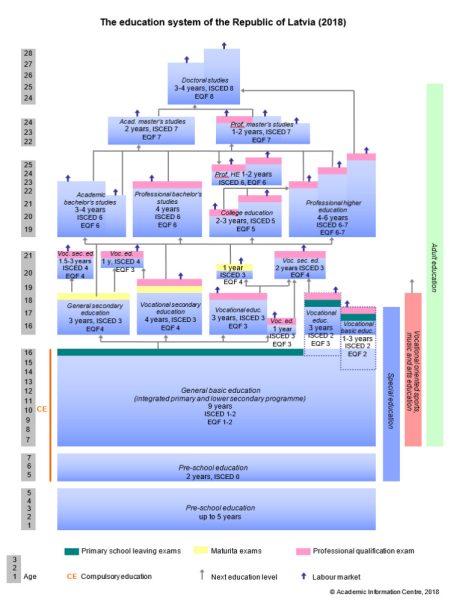
General education in Latvia in total lasts 12 years consisting of compulsory 9-years basic education and 3-years secondary education. Secondary education stage comprises general secondary education, vocational secondary education and vocational education.
Latvian Qualifications Framework (LQF). The Latvian Qualifications Framework is a system of eight levels encompassing all education levels (basic, secondary, and higher education) and all types of education (general, vocational, and academic), as well as professional qualifications acquired outside of formal education. LQF levels are described by the learning outcomes to be attained at each level.
Professional qualification levels (PQF). The professional qualification level is the theoretical and practical training corresponding to the framework structure of Latvian qualifications, which is characterized by the learning results that can be achieved at the relevant level, which gives the opportunity to perform work corresponding to a certain level of complexity and responsibility. PQF covers only professional education, which results in the award of a professional qualification. Professional qualification levels PQF are defined in the Law on Vocational Education.
European Professional Card. The European Professional Card is an electronic document equivalent to a decision on the recognition of professional qualifications. European citizens who have obtained professional qualifications in an EU country can apply for the European Professional Card, which is available for those wishing to establish permanent professional activity as well as those wishing to provide temporary services. These regulations provide a clear foundation for the organization and quality assurance of the professional education system in Latvia, designed to meet the demands of the modern labor market and ensure a high standard of education.
Objectives of Education Policy 2021 - 2027
Overarching goal of education development 2021-2027. is to provide quality educational opportunities for all Latvians to promote the development and realization of their potential throughout their lives and to develop their ability to change and responsibly manage constant changes in society and the economy.
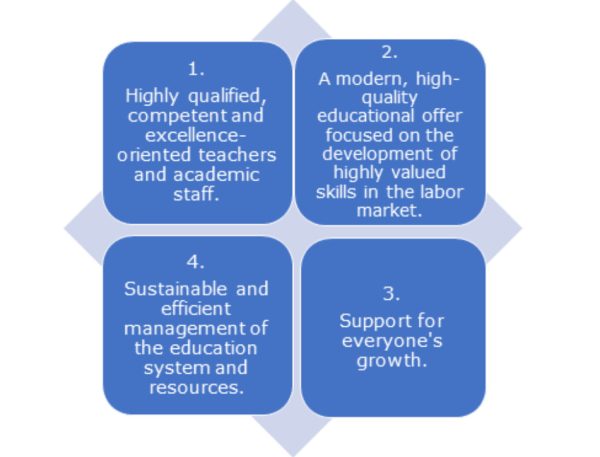
Ensuring that the offer of vocational education programs is in line with labour market trends is a priority. Many measures have been taken in the 2014-2020 programming period and the preconditions have been created to ensure such compliance. Since 2015, Sector Expert Councils (NEPs) have been formally operating (in accordance with the Law on Vocational Education) and are involved in the planning and implementation of vocational education. This applies both to the planning of the number of learners in accordance with the needs and development trends of the industry, and (at the level of delegated experts) by participating in the development of the content of vocational education programs, the development of examination content and the taking of qualification examinations. An important area of activity is the system of sectoral qualifications and the structure of sectoral qualifications, including evaluating the topicality of vocational education programs in relation to the qualifications required by the sectors, developing standards and advancing other industry issues.
To ensure the conformity of vocational education to the needs of the labour market collaboration among vocational education institutions and employers has been initiated and as a result, the possibilities for professional practice are guaranteed and common educational programs are developed.
In Latvia, professional education is regulated by several Cabinet of Ministers' regulations and laws. These include standards for vocational education programs and qualifications that can be obtained outside formal education. The Ministry of Education and Science, along with the National Centre for Education and other bodies, develop and review these standards. There are some important laws and Cabinet of Ministers' regulations:
- Law on Vocational Education (1999)
- Law on Education (Education act) (1998)
- Regulations No. 332 on the state vocational secondary education standard and the state vocational education standard (2020)
- Regulations No. 220 on admission procedures in professional education programs and deduction from them (2023)
- And others
According to the Cabinet of Ministers' regulations, the Ministry of Education and Science and the National Centre for Education, in cooperation with the Tripartite Cooperation Sub-council of Vocational Education and Employment, organize the development and expert examination of draft professional standards and vocational standards, involving representatives from sectoral ministries and professional organizations. Professional education programs are developed by educational institutions in coordination with experts in industries.
Study programs at Riga State Technical School (RSTS). Currently, 22 vocational education programs are being implemented in RSTS and 33 different qualifications are possible to acquire in the following nine departments at RSTS: Auto, Computer, Business, Chemistry technology, Energetics, Mechanical engineering, Printing, Woodworking and Railway.
The good experiences in vocational automotive programs at Riga State Technical School focus on combining hands-on training with theoretical knowledge. Providing these programs demands up-to-date study equipment, the appropriate (necessary) number of spots and vehicles needed to be repaired in practical training, and partnerships with automotive companies. Our students gain practical experience in vehicle diagnostics, maintenance, and repair, supplemented by internships in the industry in Latvia as well as abroad.
Three qualifications are offered to study at Riga State Technical School: car mechanic, auto body repair, and vehicle painter. Further, we will give more insight into the Auto mechanic study program and Auto body repair study program.
The auto body repair study program aims to prepare a body repair technician who performs vehicle,vehicle components, tractor bodies, cabins, vans, and wagons, as well as their components, replacement and repair, restoration and surface preparation for painting.
The car mechanic study program aims to prepare a car mechanic who can carry out car diagnostics, technical maintenance, and repair, disassembly, assembly, repair, and regulation of assemblies and aggregates, using technical documentation, complying with labor and environmental protection requirements, able to cooperate with the customer and supervise lower qualified employees.
The main tasks of the study programAs a result of the educational process, give opportunities to acquire the following knowledge, skills, and competencies:
- To plan and organize your work and workplace, observing the requirements of occupational safety, electrical safety, fire safety, and environmental protection.
- Provide safe working conditions for yourself and other employees by choosing appropriate work methods and aids.
- Use professional terminology in the national language and electronic databases in a foreign language (Note - first foreign language is English, second - Russian).
- Read blueprints, electrical and kinematic diagrams.
- Carry out technical maintenance and diagnostics of the car, its systems, and units.
- Determine the necessary repair works according to the manufacturer's technology.
- Determine the cost of repairs and assess the economic validity of repairs.
- Repair and adjust car assemblies and aggregates using appropriate equipment, tools, and auxiliary devices.
- Check the quality of repair, the operation of car systems and mechanisms.
- Ensure appropriate use and maintenance of assigned tools, equipment and inventory in working order.
- Solve non-standard situations, and replace original parts with repair parts.
- Solve problem situations, cooperate with the client and provide information about services.
- Self-educating, constantly improving professional competence according to the level of development of the technology and equipment used.
- Communicate in the national language and in one foreign language.
- To comply with the regulatory acts regulating labor legal relations.
Advanced study programs in the automotive department might also encompass emerging technologies such as electric cars and hybrid vehicles, given their rapid integration into the market and our daily lives. Electric cars play a pivotal role, while hybrid vehicles, bridging the gap between traditional internal combustion engines and fully electric vehicles, are also instrumental in this electric revolution.
The experts from Riga State Technical School, professionals in the automotive industry, and members of the expert council are unanimous in their belief in the need to enhance the current car mechanic study program within the car department at RSTS. They propose the inclusion of specific modules covering the repair, disassembly, assembly, and technical maintenance of electric cars and hybrid vehicles.
Legislation a Educational system Latvian Republic
The Latvian education system consists of pre-school education, primary education, secondary education and higher education.

General education in Latvia lasts a total of 12 years and consists of 9 years of compulsory primary education and 3 years of secondary education. Secondary education includes general secondary education, vocational secondary education and vocational education.
Latvian Qualifications Framework (LQF). The Latvian Qualifications Framework is an eight-level system that covers all levels of education (primary, secondary and higher education) and all types of education (general, vocational and academic), as well as professional qualifications acquired outside formal education. The LQF levels are described by the learning outcomes to be achieved at each level.
Professional Qualification Levels (PQF). The level of vocational qualification is the theoretical and practical training corresponding to the framework structure of Latvian qualifications, which is characterised by learning outcomes that can be achieved at the relevant level, giving the opportunity to perform work corresponding to a certain level of complexity and responsibility. PQF includes only vocational training resulting in the award of a vocational qualification. The levels of the PQF are defined in the Vocational Training Act.
European Professional Card . The European Professional Card is an electronic document equivalent to a decision recognising a professional qualification. European citizens who have obtained a professional qualification in an EU country can apply for a European Professional Card, which is available for those who want to set up a permanent professional activity and for those who want to provide temporary services. These regulations provide a clear basis for the organisation and quality assurance of the vocational training system in Latvia, which is designed to meet the requirements of the modern labour market and to ensure a high standard of training.
Education policy objectives 2021 - 2027
The overarching goal of education development 2021-2027. is to provide all Latvians with quality educational opportunities to support the development and realisation of their potential throughout their lives and to develop their capacity to change and responsibly manage the constant changes in society and the economy.

Ensuring that the supply of vocational training programmes is in line with labour market trends is a priority. A number of measures have been taken in the 2014-2020 programming period and the conditions have been created to ensure this. Since 2015, Sectoral Vocational Councils (SVCs) have been formally operating (in accordance with the Vocational Training Act) and are involved in the planning and implementation of vocational training. This involves both planning the number of learners in accordance with the needs and development trends of the sector and (at the level of delegated experts) participating in the development of the content of vocational training programmes, the development of the content of examinations and the passing of qualification examinations. An important area of activity is the system of sectoral qualifications and the structure of sectoral qualifications, including the assessment of the relevance of vocational training programmes in relation to the qualifications required by the sector, the development of standards and the advocacy of other sectoral issues.
To ensure that vocational training is in line with the needs of the labour market, cooperation between vocational training institutions and employers has been initiated, resulting in guaranteed apprenticeship opportunities and the development of joint training programmes.
In Latvia, vocational education is regulated by several regulations and laws of the Cabinet of Ministers. These include standards for vocational training programmes and qualifications that can be obtained outside formal education. The Ministry of Education and Science, together with the National Centre for Education and other bodies, develops and revises these standards. There are several important laws and cabinet regulations:
- Vocational Training Act (1999)
- Education Act (1998)
- Decree No. 332 on the State Standard for Secondary Vocational Education and the State Standard for Vocational Education (2020)
- Regulation No. 220 on admissions to and deductions from vocational training programmes (2023)
- And others
The Ministry of Education and Science and the National Centre for Education, in cooperation with the Tripartite Cooperation Sub-Council for Vocational Training and Employment, are organising the drafting and expert assessment of draft occupational standards and vocational standards in accordance with a Cabinet Order. , with the participation of representatives of line ministries and professional organisations. Vocational training programmes are developed by educational institutions in coordination with industry experts.
Study programmes in Rize State Technical School ( RSTS) . There are currently 22 vocational training programmes in RSTS and 33 different qualifications can be obtained in the following nine RSTS branches: Auto, Computer, Business, Chemical Technology, Energy, Engineering, Printing, Woodworking and Railways.
Good experience with vocational automotive programs in Riga State Technical School focuses on combining practical training with theoretical knowledge. The provision of these programmes requires modern study facilities, an adequate (necessary) number of places and vehicles to be repaired during practical training, and partnerships with automotive companies. Our students gain practical experience in vehicle diagnostics, maintenance and repair, complemented by internships in industry in Latvia and abroad.
Three qualifications are offered for study at the Riga State Technical College: car mechanic, car body repairer and vehicle painter. We will also present the study programme of the Car Mechanic and the Study Programme of Body Repair.
The body repair program aims to prepare body repair technicians who perform vehicle, vehicle parts, tractor, cab, van and wagon bodywork, as well as parts, replacements and repairs, restoration and surface preparation for painting.
The main tasks of the study programme: As a result of the educational process, to give the opportunity to acquire the following knowledge, skills and competences:
- Plan and organise their work and workplace in compliance with the requirements of occupational safety, electrical safety, fire safety and environmental protection.
- Ensure safe working conditions for themselves and other employees by choosing appropriate working methods and equipment.
- Use professional terminology in the national language and electronic databases in a foreign language (note - the first foreign language is English, the second - Russian).
4. Read the plans, electrical and kinematic diagrams. - Defect vehicle bodies and determine the necessary repair work according to the manufacturer's technology.
- Determine the cost of vehicle bodywork repairs and assess the economic justification for the repairs.
- Dismantle and assemble the separate bodywork finishing parts, carry out the anti-corrosion treatment.
- Replace vehicle body parts using welding, riveting and bonding techniques according to the manufacturer's technology.
- Restore the geometric dimensions of the vehicle body using the body repair stand and technical databases.
- Restore the surface shapes of vehicle body parts, straightening tools, bonding and tinning technology.
- Check the quality of work by measuring and visually evaluating vehicle bodies.
- Ensure appropriate use and maintenance of assigned tools, equipment and inventory in working order.
- Resolve problem situations, collaborate with the client and provide information about services.
- Self-education, continuously improving professional competence according to the level of development of the technology and equipment used.
- Comply with regulatory acts governing labour relations.
The aim of the automechanic study programme is to prepare an automechanic who is able to perform car diagnostics, technical maintenance and repairs, disassembly, assembly, repairs and adjustment of assemblies and aggregates using technical documentation, who meets the requirements of labour and environmental protection, who is able to cooperate with the customer and supervise less qualified employees.
Main objectives of the study programme : To give the opportunity to acquire the following knowledge, skills and competencies as a result of the educational process:
- Plan and organise their work and workplace in compliance with the requirements of occupational safety, electrical safety, fire safety and environmental protection.
- Ensure safe working conditions for themselves and other employees by choosing appropriate working methods and equipment.
- Use professional terminology in the national language and electronic databases in a foreign language (note - the first foreign language is English, the second - Russian).
- Read the plans, electrical and kinematic diagrams.
- Perform technical maintenance and diagnostics of the vehicle, its systems and units.
- Determine the necessary repairs according to the manufacturer's technology.
- Determine the cost of repairs and assess the economic justification for repairs.
- Repair and adjustment of automotive assemblies and aggregates using appropriate equipment, tools and auxiliary devices.
- Check the quality of repair, functioning of the systems and mechanisms of the car.
- Ensure appropriate use and maintenance of assigned tools, equipment and inventory in working order.
- Deal with non-standard situations and replace original parts with spare parts.
- Resolve problem situations, collaborate with the client and provide information about services.
- Self-education, continuously improving professional competence according to the level of development of the technology and equipment used.
- Communicate in the national language and one foreign language.
- Comply with regulatory acts governing labour relations.
Advanced degree programs in the Department of Automotive Engineering may also include emerging technologies such as electric cars and hybrid vehicles, given their rapid integration into the marketplace and our daily lives. Electric cars play a pivotal role, while hybrid vehicles, which bridge the gap between traditional internal combustion engines and all-electric vehicles, are also instrumental in this electric revolution.
Experts from the Riga State Technical School, professionals in the automotive industry and members of the professional council are united in their conviction of the need to improve the current study programme of auto mechanics within the field of auto at RSTS. They propose the inclusion of specific modules covering the repair, disassembly, assembly and technical maintenance of electric and hybrid vehicles.
Legislation and the educational system of the Republic of Latvia

General education in Latvia in total lasts 12 years consisting of compulsory 9-years basic education and 3-years secondary education. Secondary education stage comprises general secondary education, vocational secondary education and vocational education.
Latvian Qualifications Framework (LQF). The Latvian Qualifications Framework is a system of eight levels encompassing all education levels (basic, secondary, and higher education) and all types of education (general, vocational, and academic), as well as professional qualifications acquired outside of formal education. LQF levels are described by the learning outcomes to be attained at each level.
Professional qualification levels (PQF). The professional qualification level is the theoretical and practical training corresponding to the framework structure of Latvian qualifications, which is characterized by the learning results that can be achieved at the relevant level, which gives the opportunity to perform work corresponding to a certain level of complexity and responsibility. PQF covers only professional education, which results in the award of a professional qualification. Professional qualification levels PQF are defined in the Law on Vocational Education.
European Professional Card. The European Professional Card is an electronic document equivalent to a decision on the recognition of professional qualifications. European citizens who have obtained professional qualifications in an EU country can apply for the European Professional Card, which is available for those wishing to establish permanent professional activity as well as those wishing to provide temporary services. These regulations provide a clear foundation for the organization and quality assurance of the professional education system in Latvia, designed to meet the demands of the modern labour market and ensure a high standard of education.
Objectives of Education Policy 2021 - 2027
Overarching goal of education development 2021-2027. is to provide quality educational opportunities for all Latvians to promote the development and realization of their potential throughout their lives and to develop their ability to change and responsibly manage constant changes in society and the economy.

Ensuring that the offer of vocational education programs is in line with labour market trends is a priority. Many measures have been taken in the 2014-2020 programming period and the preconditions have been created to ensure such compliance. Since 2015, Sector Expert Councils (NEPs) have been formally operating (in accordance with the Law on Vocational Education) and are involved in the planning and implementation of vocational education. This applies both to the planning of the number of learners in accordance with the needs and development trends of the industry, and (at the level of delegated experts) by participating in the development of the content of vocational education programs, the development of examination content and the taking of qualification examinations. An important area of activity is the system of sectoral qualifications and the structure of sectoral qualifications, including evaluating the topicality of vocational education programs in relation to the qualifications required by the sectors, developing standards and advancing other industry issues.
To ensure the conformity of vocational education to the needs of the labour market collaboration among vocational education institutions and employers has been initiated and as a result, the possibilities for professional practice are guaranteed and common educational programs are developed.
In Latvia, professional education is regulated by several Cabinet of Ministers' regulations and laws. These include standards for vocational education programs and qualifications that can be obtained outside formal education. The Ministry of Education and Science, along with the National Centre for Education and other bodies, develop and review these standards. There are some important laws and Cabinet of Ministers' regulations:
- Law on Vocational Education (1999)
- Law on Education (Education act) (1998)
- Regulations No. 332 on the state vocational secondary education standard and the state vocational education standard (2020)
- Regulations No. 220 on admission procedures in professional education programs and deduction from them (2023)
- And others
According to the Cabinet of Ministers' regulations, the Ministry of Education and Science and the National Centre for Education, in cooperation with the Tripartite Cooperation Sub-council of Vocational Education and Employment, organize the development and expert examination of draft professional standards and vocational standards, involving representatives from sectoral ministries and professional organizations. Professional education programs are developed by educational institutions in coordination with experts in industries.
Study programs at Riga State Technical School (RSTS). Currently, 22 vocational education programs are being implemented in RSTS and 33 different qualifications are possible to acquire in the following nine departments at RSTS: Auto, Computer, Business, Chemistry technology, Energetics, Mechanical engineering, Printing, Woodworking and Railway.
The good experiences in vocational automotive programs at Riga State Technical School focus on combining hands-on training with theoretical knowledge. Providing these programs demands up-to-date study equipment, the appropriate (necessary) number of spots and vehicles needed to be repaired in practical training, and partnerships with automotive companies. Our students gain practical experience in vehicle diagnostics, maintenance, and repair, supplemented by internships in the industry in Latvia as well as abroad.
Three qualifications are offered to study at Riga State Technical School: car mechanic, auto body repair, and vehicle Painter. Further, we will give more insight into the Auto mechanic study program and Auto body repair study program.
The auto body repair study program aims to prepare a body repair technician who performs vehicle, vehicle components, tractor bodies, cabins, vans, and wagons, as well as their components, replacement and repair, restoration and surface preparation for painting.
The main tasks of the study program: As a result of the educational process, give opportunities to acquire the following knowledge, skills, and competencies:
- To plan and organize your work and workplace, observing the requirements of occupational safety, electrical safety, fire safety, and environmental protection.
- Provide safe working conditions for yourself and other employees by choosing appropriate work methods and aids.
- Use professional terminology in the national language and electronic databases in a foreign language (Note - first foreign language is English, second - Russian).
4. Read blueprints, electrical and kinematic diagrams. - To defect the vehicle bodies and determine the necessary repair works according to the manufacturer's technology.
- To determine the costs of vehicle body repairs and to assess the economic validity of repairs.
- Disassemble and assemble the separate finishing parts of the body, carry out anti-corrosion treatment.
- Replace vehicle body parts using welding, riveting and gluing techniques according to the manufacturer's technology.
- Restore the geometric dimensions of the vehicle body, using the bodywork repair stand and the technical databases.
- To renew the shapes of the surfaces of vehicle body parts, straightening tools, puttying and tinning technologies.
- Control the quality of work by measuring and visually evaluating vehicle bodies.
- Ensure appropriate use and maintenance of assigned tools, equipment and inventory in working order.
- Solve problem situations, cooperate with the client and provide information about services.
- Self-educating, constantly improving professional competence according to the level of development of the technology and equipment used.
- To comply with the regulatory acts regulating labor legal relations.
The car mechanic study program aims to prepare a car mechanic who can carry out car diagnostics, technical maintenance, and repair, disassembly, assembly, repair, and regulation of assemblies and aggregates, using technical documentation, complying with labor and environmental protection requirements, able to cooperate with the customer and supervise lower qualified employees.
The main tasks of the study program: As a result of the educational process, give opportunities to acquire the following knowledge, skills, and competencies:
- To plan and organize your work and workplace, observing the requirements of occupational safety, electrical safety, fire safety, and environmental protection.
- Provide safe working conditions for yourself and other employees by choosing appropriate work methods and aids.
- Use professional terminology in the national language and electronic databases in a foreign language (Note - first foreign language is English, second - Russian).
- Read blueprints, electrical and kinematic diagrams.
- Carry out technical maintenance and diagnostics of the car, its systems, and units.
- Determine the necessary repair works according to the manufacturer's technology.
- Determine the cost of repairs and assess the economic validity of repairs.
- Repair and adjust car assemblies and aggregates using appropriate equipment, tools, and auxiliary devices.
- Check the quality of repair, the operation of car systems and mechanisms.
- Ensure appropriate use and maintenance of assigned tools, equipment and inventory in working order.
- Solve non-standard situations, and replace original parts with repair parts.
- Solve problem situations, cooperate with the client and provide information about services.
- Self-educating, constantly improving professional competence according to the level of development of the technology and equipment used.
- Communicate in the national language and in one foreign language.
- To comply with the regulatory acts regulating labor legal relations.
Advanced study programs in the automotive department might also encompass emerging technologies such as electric cars and hybrid vehicles, given their rapid integration into the market and our daily lives. Electric cars play a pivotal role, while hybrid vehicles, bridging the gap between traditional internal combustion engines and fully electric vehicles, are also instrumental in this electric revolution.
The experts from Riga State Technical School, professionals in the automotive industry, and members of the expert council are unanimous in their belief in the need to enhance the current car mechanic study program within the car department at RSTS. They propose the inclusion of specific modules covering the repair, disassembly, assembly, and technical maintenance of electric cars and hybrid vehicles.
WP1.3 Setkání partnerů / Meeting of partners
7.6.2023 Meeting in České Budějovice
On 7 and 8 June 2023, an international meeting was held at the "Secondary School of Mechanical and Electrical Engineering" in the Czech Republic within the Erasmus+ KA2 Strategic Partnership Project "Future Transport, Sustainable Transport, Electromobility, Education for the Future" No. 2022-1-CZ01-KA210-VET-000082444. The school's director Jaroslav Koreš together with deputy director Václav Chochol and project coordinator Tomáš Rolink welcomed the education methodologist of the Auto Department Rikards Damrozi-Sprunci and project manager Liena Ādamsone from Riga State Technical School (RSTS). During the meeting, they discussed the progress of the project work, planned activities and expected results, including considerations on the possible creation of a "Hachspace". Representatives from RSTS were given a tour of the educational institution "Secondary Industrial School of Mechanical and Electrical Engineering". The Czech students demonstrated their expertise in the field of electric vehicles by presenting toy radio controlled cars on which they demonstrated the entire design and construction cycle. Rikardas Damrozes-Sprunces' presentation featured toy radio-controlled cars made by RSTS students. Another presentation presented the result of a collaboration between teachers and students, which is a working electric bicycle with charging capability. The meeting concluded by stating that these hands-on projects offer an interesting and engaging method of deepening the knowledge of Czech students and RSTS students. In the second part of the meeting, the Czech educators Šimek, Strnad, Reitingerová, Hána, Rolínek and the Lavička workshop discussed. The project outputs such as e-learning materials and a trilingual (English, Czech and Latvian) dictionary of professional terms in the field of auto mechanics and electrical engineering were analysed. The eTwinning project was discussed within the broader scope of "Future Transport, Sustainable Transport, Electromobility, Education for the Future". Towards the end of the meeting, the project coordinator Tomáš Rolinek outlined the upcoming activities and distributed the tasks to the project partners and set a timetable for the project implementation.
7.6.2023 Meeting in Ceske Budejovice.
On June 7 and 8, 2023 was held an international meeting at the 'Medium Industry School machine a Electrical' in the Czech Republicand the scope of the Erasmus+ KA2 Strategic Partnership project "Transport of the Future, Sustainable Transport, Electromobility, Education for the Future" No. 2022-1-CZ01-KA210-VET-000082444. The director of the school, Jaroslav Koresh, along with deputy director Vaclav Chochol and project coordinator Tomas Rolinek, welcomed the educational methodologist of Auto department, Ricardo Damrozi-Sprunci, and project manager, Liena Adamsone from Riga State Technical School (RSTS). The meeting covered discussions on the progress of works within the project, planned activities, and expected results, including considerations for the potential creation of "Hachspace". Representatives from RSTS were given a tour of the educational institution 'Medium Industry School machine a Electrical.' Czech students showcased their expertise in electric cars by presenting toy radio-controlled cars, demonstrating the full design and construction cycle. In a presentation by Ricardo Damroses-Sprunces, RSTS students' toy radio-controlled cars were featured. Another presentation showcased the collaborative result of teachers and students a functional electric bicycle with charging capabilities. The meeting concluded that these practical projects offered an interesting and engaging method to enhance knowledge for both Czech and RSTS students. The second part of the meeting involved discussions with Czech educators Simek, Strnad, Reitinger, Hána, Rolinek, Reitinger, Simek, and workshops Bench. The analysis of project outcomes, such as e-learning materials and a trilingual (English, Czech, and Latvian) dictionary of professional terms in car mechanics and electrotechnics, was carried out. The eTwinning project, within the broader scope of "Transport of the Future, Sustainable Transport, Electromobility, Education for the Future" was discussed. Towards the meeting's end, project coordinator Tomas Rolinek outlined upcoming activities and assigned tasks to project partners, establishing a timeline for project execution.
22.11.2022 Erasmus+ project Electromobility: working visit to partner school in Riga
As part of our Erasmus Electromobility project, we took part in a working visit and meeting with a partner school in Riga, Latvia, on 22 November 2022. The transnational meeting of the project partners took place at the RSTS Technology and Innovation Centre. The visit was attended by our school principal Mr. Koreš, deputy principal Mr. Chochol and project manager Mr. Rolínek. Riga State Technical School (RSTS) was represented by the Education Methodologist of the Auto p.i. department. Rikarda Damroze-Sprunce, teacher of the Energy Department Sandis Breiers, English teacher Alla Zhuchenko, Head of IT Department Normunds Pauders and Project Manager Liena Ādamsone.
During this visit, we got to know our partner's project team and the equipment of their school. During the meeting, Jaroslav Koreš and Tomáš Rolínek from the "Secondary Industrial School of Mechanical and Electrical Engineering" presented us the goal, main tasks, deadlines and results to be achieved during the project. They discussed the method and timetable for the development of the project results. The possible creation of "Hachspace", its objectives, target group and expected benefits for the whole society were also discussed.
We also discussed further possibilities of cooperation between our schools and the possibilities of using individual subjects to integrate electromobility into our educational process. This cooperation will allow us to exchange experiences and new knowledge that can lead to innovations in our education system.
We look forward to further cooperation with our partners in Riga and believe that this exchange of experience will bring positive results for both our schools.
The programme of the meeting is available for preview here.
22.11.2022 Erasmus+ project Electromobility: working visit to partner school in Riga
In the framework of our Erasmus project Electromobility, we took part in a working visit and meeting with our partner school in Riga, Latvia on 22 November 2022. The transnational project partner meeting was held at the Technology and Innovation Center of RSTS. This visit was attended by our school principal, Mr. Koreš, deputy principal, Mr. Chochol, and project manager, Mr. Rolinek. Riga State Technical School (RSTS) was represented by the educational methodologist of the Auto Department p.i. Rikarda Damroze-Sprunce, teacher of the Energetic department Sandis Breiers, English language teacher Alla Zhuchenko, head of IT department Normunds Pauders and project manager Liena Ādamsone.
During this visit we got acquainted with our partner's project team and the facilities of their school. During the meeting, Jaroslav Koreš and Tomas Roline from "Střední průmyslova škola strojní a elektrotechnická" presented the goal, the main tasks, deadlines of tasks, and the project results to be achieved during the project. They discussed the way and timeline of the development of the project results. There were also discussions about the potential creation of 'Hachspace,' its goals, the target audience, and the expected benefits for society as a whole.
We also discussed further possibilities of cooperation between our schools and the possibilities of using individual subjects in the involvement of Electromobility in our educational process. This cooperation will allow us to exchange experiences and new knowledge that can lead to innovations in our education system.
We look forward to further cooperation with our partners in Riga and believe that this exchange of experience will bring positive results for both our schools.
WP2.1 Ebook
WP2.2 Dictionary
WP2.3 E-bike and e-scooter
WP2.3.1 Czech e-scooter
Our students presented their electric scooter at an online conference
On January 12, 2024, our talented students presented their creative outputs of work on building an electric scooter. This initiative was part of the wider Electromobility project, and our students, led by colleagues Strnad and Simek, demonstrated their ability to innovate and work as a team.
The competitive nature of the e-scooter design brought a new dimension to the project. Starting with two competing teams vying for the best design, the two teams were awarded and merged after the first phase. Working together, the students then realized the construction of the scooter, not only creating an innovative technical product but also strengthening team spirit.
The uniqueness of the project lies not only in the resulting e-scooters, but also in the international cooperation with Latvian students. The Latvians presented their unique approach, where their scooter generates energy in the opposite way, building a wheel that creates energy.
The international online conference not only allowed the presentation of the results, but also provided a space for an inspiring exchange of thoughts and ideas between the two groups of students. The whole project shows how creativity and innovation can shape the future of electromobility.
We congratulate our students on their success and look forward to more inspiring projects like this.
WP2.3.2 Latvian electro bicycle
Powering the Future Bicycle as a Generator
WP2.4 Competition toy electrocars
WP 2.4.1 Czech partner - Competitions - toy electric car
8.6. 2023 Student competition in building and design of electric vehicles received well-deserved attention
The pupils presented their electric vehicles in English to representatives of the Latvian school during their visit to České Budějovice and also the following day to representatives of companies at a round table organized at the school in České Budějovice and showed their vehicles to journalists.
The Czech students in the field of Electromobility were divided into four groups at the beginning of this activity. All of them were given a single task - the task was to invent and build an electric vehicle, while they had to meet the average specified speed on a specified track, the accuracy of stopping at a specified distance, and the trajectory and type of drive. The pupils solved the project independently using the knowledge acquired in the vocational subjects. The Latvian pupils worked in a similar way; they focused mainly on the competition in designing the trolleys and working in professional CAD software. In the course of their work, they had the opportunity to consult any problems with the teachers. The actual implementation was solved both on their own in their free time and in workshops and training sessions in vocational subjects.
Thanks to this, the possibility of using project-based learning as a standard part of teaching was practically verified. Thanks to the very positive evaluation of the teachers, this activity will also be included in the standard teaching in the 1st year of the Electromobility course.
8.6. 2023 Student competition in building and design of electric vehicles received well-deserved attention
The students presented their electric vehicles in English to representatives of the Latvian school during their visit to České Budějovice and also the following day to representatives of companies at a round table organized at the school in České Budějovice and showed their vehicles to journalists.
At the beginning of this activity, the Czech students from the Electromobility class were divided into four groups. All of them were given a single task - the task was to invent and produce an electric vehicle, while they had to meet the average speed on a specified track, the accuracy of stopping at a specified distance, and to follow the trajectory and type of drive. The pupils solved the project independently using the knowledge acquired in the vocational subjects. The Latvian pupils worked in a similar way; they focused mainly on the competition in designing the trolleys and working in professional CAD software. In the course of their work, they had the opportunity to consult any problems with the teachers. The actual implementation was solved both on their own in their free time and in workshops and training sessions in vocational subjects.
Thanks to this, the possibility of using project-based learning as a standard part of teaching was practically verified. Thanks to the very positive evaluation of the teachers, this activity will also be included in the standard curriculum of the 1st year in the field of Electromobility.
Competition - Scooter frame variants
WP2.4.2 Latvian partner - Competitions - toy electric car
Student presentations:
Presentation 1
Presentation 2
Presentation 3
Presentation 4
Presentation 5
Presentation 6
Presentation 7
Presentation 8
Presentation 9
Wheels of Creativity The Toy Car Making Competition
WP2.5 E-Twinning

The e-twinning project Future Vehicle enabled pupils to improve their English
Etwinning project Vehicle of the future - pupils of 2 classes from both schools had the opportunity to design and describe an ecological vehicle of the future with the design of an alternative drive, to test their knowledge of Aj. This activity included online transmissions, where both groups also connected with the teachers. Another benefit was to test the knowledge of Czech pupils at the British Centre of the University of South Bohemia. Thanks to this experience, this testing was included in the standard teaching of Aj in a Czech school. It also contributed to the fact that our school became more deeply involved in the preparation of pupils for the Cambridge exams and became a preparatory partner school of two certification centres in České Budějovice - the British Centre of JU and the Centre for European Regional Examinations. Thanks to this, the school management also allowed the fourth year students to substitute the matriculation exam with a language certificate.
The e-twinning project Future Vehicle enabled pupils to improve their English
Etwinning project Future means of transport - pupils from 2 classes from both schools had the opportunity to design and describe an environmentally friendly means of transport of the future with the design of an alternative propulsion system, test their knowledge of Aj. This activity included online transmissions, where both groups also connected with the teachers. Another benefit was to test the knowledge of Czech pupils at the British Centre of the University of South Bohemia. Thanks to this experience, this testing was included in the standard teaching of Aj in a Czech school. It also contributed to the fact that our school became more deeply involved in the preparation of pupils for the Cambridge exams and became a preparatory partner school of two certification centres in České Budějovice - the British Centre of JU and the Centre for European Regional Examinations. Thanks to this and the school management, the fourth year students were able to substitute the matriculation exam with a language certificate.
Czech e-Twinning partner
First online meeting
Online meeting 3 November 2023
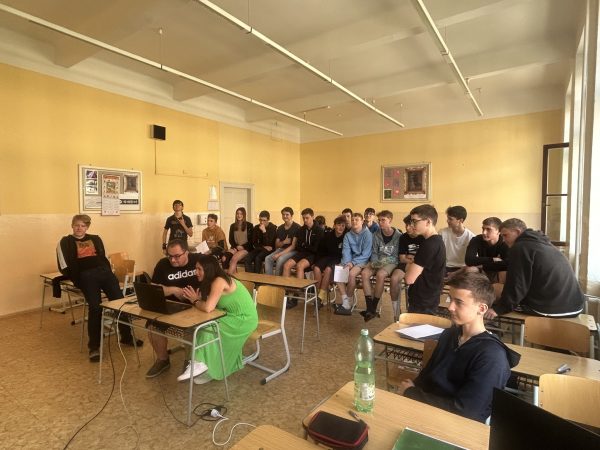
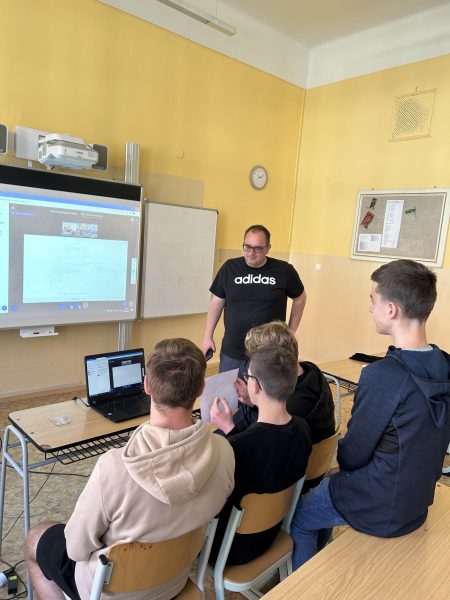
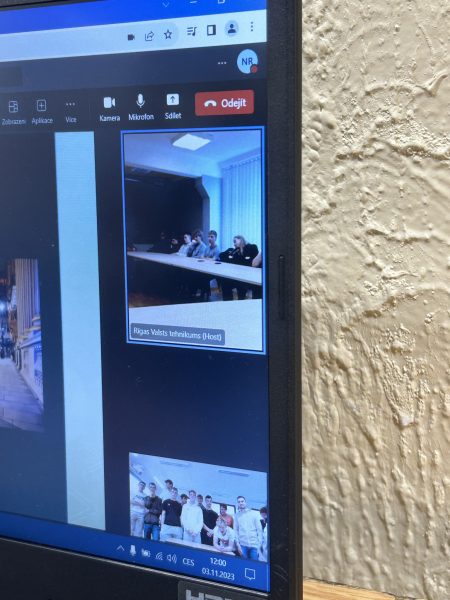
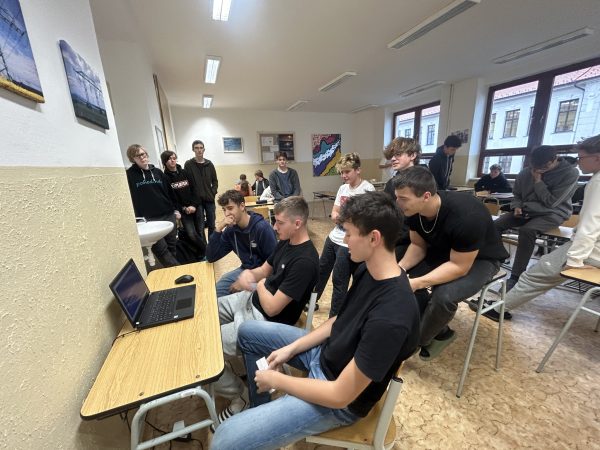
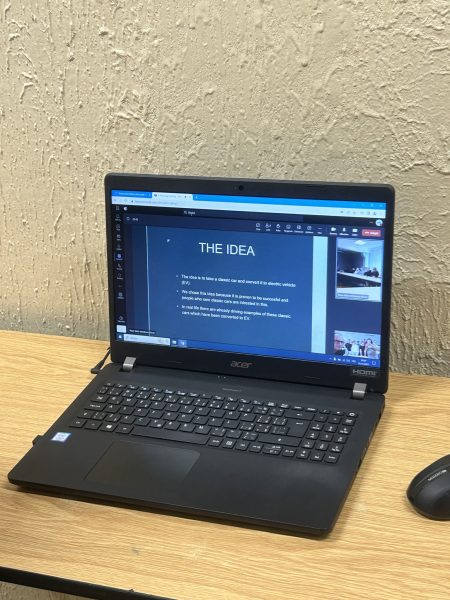
Latvian partner e-Twinning
First online meeting
Second online meeting
Student presentations about school
WP3.1 Hackspace
WP3.1.1 Opening ceremony of the hackspace (28 April 2023)
Opening ceremony of the hackspace (28 April 2023)
On Friday 28 April 2023 at 10:00 a.m. the first hackspace in the South Bohemia region (workshops for the general public) was opened in the woodshop of our school.
The SPŠSE Hackspace was created within the Erasmus+ programme (project name: 2022-1-CZ01-KA210-VET-000082444 Future Transport, Sustainable Transport, Electromobility, Education for the Future; support area: Erasmus+ Vocational Education and Training - Partnership for Cooperation) and it is the first hackspace in the South Bohemia Region.
Hackspace is, among other things:
- a public workshop with various equipment used for the realization of own projects,
- an inspiring space where people - both young and old - collaborate on interesting projects and share their interests,
- a centre for learning and sharing experiences.
We are aware that people have a lot of interesting ideas in their heads, but often lack the equipment needed to implement them. Thanks to the hackspace, many interesting projects will be able to emerge, both in education and leisure activities. The aim of creating a hackspace is also to increase interest in technology in general.
The biggest "draw" of our workshop is the universal spindle lathe TOS S-28. Other equipment of the hackspace includes a TOS bench drill, a two-disc bench grinder, a band saw for metal, a Narex 230 and Narex 125 angle grinder, a hot air gun, an acoustic drill, a wide range of Tona Expert hand tools, a PC set-up together with a 3D printer, a soldering station with microsolder, a hot air soldering station, a laboratory digital power supply and a multimeter. The workshop also has compressed air, 400 V and 240 V distribution. The workshop equipment will be continuously updated with new machines and equipment. The workshop will not be equipped with consumables or production material (each applicant must provide his own material).
Opening ceremony of the hackspace (28 April 2023)
On Friday 28 April 2023 at 10:00 a.m., the first hackspace in the South Bohemia region (workshops for the general public) was opened in the woodshop of our school.
Hackspace SPŠSE was created within the Erasmus+ programme (project name: 2022-1-CZ01-KA210-VET-000082444 Future Transport, Sustainable Transport, Electromobility, Education for the Future; support area: Erasmus+ Vocational Education and Training - Partnership for Cooperation) and it is the first hackspace in the South Bohemian Region.
Hackspace is among others:
- a public workshop with various equipment for the implementation of own projects,
- an inspiring space where people - both young and old - collaborate on interesting projects and share their interests,
- a centre for learning and sharing experiences.
We realise that people have lots of interesting ideas in their heads, but often lack the equipment needed to implement them. Thanks to the hackspace, a number of interesting projects will be able to emerge, both in education and leisure activities. The aim of creating a hackspace is also to increase interest in technology in general.
The biggest "draw" of our workshop is the TOS S-28 universal spindle lathe. Other equipment in the hackspace includes a TOS bench drill, a double disc bench grinder, a band saw for metal, a Narex 230 and Narex 125 angle grinder, a hot air gun, an acoustic drill, a wide range of Tona Expert hand tools, a PC set-up together with a 3D printer, a soldering station with microsolder, a hot air soldering station, a laboratory digital power supply and a multimeter. The workshop also has compressed air, 400 V and 240 V distribution. The workshop equipment will be continuously updated with new machines and equipment. The workshop will not be equipped with consumables or production material (each applicant must provide his own material).
WP3.1.2 Hackspace at Riga State Technical College opens to the public
Hackspace at Riga State Technical College opens to the public
The Hackspace serves as a coworking space for students, their parents, adult students from the Adult Education Centre, teachers and other members of the community at Riga State Technical College. The Hackspace "Coworking Space" is located in the Technology and Innovation Centre (70 Darzciema Street). The Hackspace "Coworking Space" is equipped with the necessary infrastructure to support coworking activities, including tables, chairs, 30 laptops, high-speed internet and 2 charging cabinets. In the future it will be complemented by a copier, printer and 3D printer. The Hackspace "Coworking Space" is open to the public three days a week (Tuesday, Wednesday and Thursday) from 3:00pm to 6:00pm. It is free for the public. On average, 2-3 people visit it per week. During the opening hours of the Hackspace "Coworking Space" there is one responsible person who supervises the use of the technical equipment and also helps when needed.
Hackspace "Coworking Space" fosters a sense of community between individuals working in the same space. This can lead to opportunities for networking, collaboration and knowledge sharing between youth and adults, between students and teachers, and between professionals and students. It can also be used for workshops and networking sessions to facilitate interaction between students from different departments, such as the Department of Energy and Business. In this way, students can develop some new products based on interdisciplinary competences. The Hackspace "Coworking Space" has collaborative spaces that encourage teamwork and project collaboration among members.
Hackspace at Riga State Technical School
Hackspace is used as a coworking space for students, their parents, adult students from the Adult Education Center, teachers, and other members of the society at Riga State Technical School. The Hackspace "Coworking Space" is located at the Technology and Innovation Center (70 Darzciema Street). Hackspace "Coworking Space" is equipped with the necessary infrastructure to support coworking activities, including desks, chairs, 30 laptops, high-speed internet, and 2 charging cabinets. In the future, it will be supplemented with a copy machine, printer, and 3D printer. Hackspace "Coworking Space" is open to the public three days a week (Tuesday, Wednesday, and Thursday) from 3:00 p.m. to 6:00 p.m. It is free of charge for the public. In average 2-3 persons per week attend it. During the open hours of Hackspace "Coworking Space" there is one responsible person who monitors the use of technical equipment and also helps in case of need.
Hackspace "Coworking Space" fosters a sense of community among individuals working in the same space. This can lead to networking opportunities, collaboration, and knowledge sharing between youngsters and adults, between students and teachers, and between professionals and learners. It also can be used for workshops and networking sessions to facilitate interactions among students from different departments, for example, the energy and commerce department. Thus, students can develop some new products based on interdisciplinary competencies. Hackspace "Coworking Space" has collaborative spaces that encourage teamwork and project collaboration among members.
